
HomePage Featured (486)
Final results for the 2021 State Rural Senior Championship held in Mooroopna on Saturday 27 March 2021 are now available.
Aggregate results:
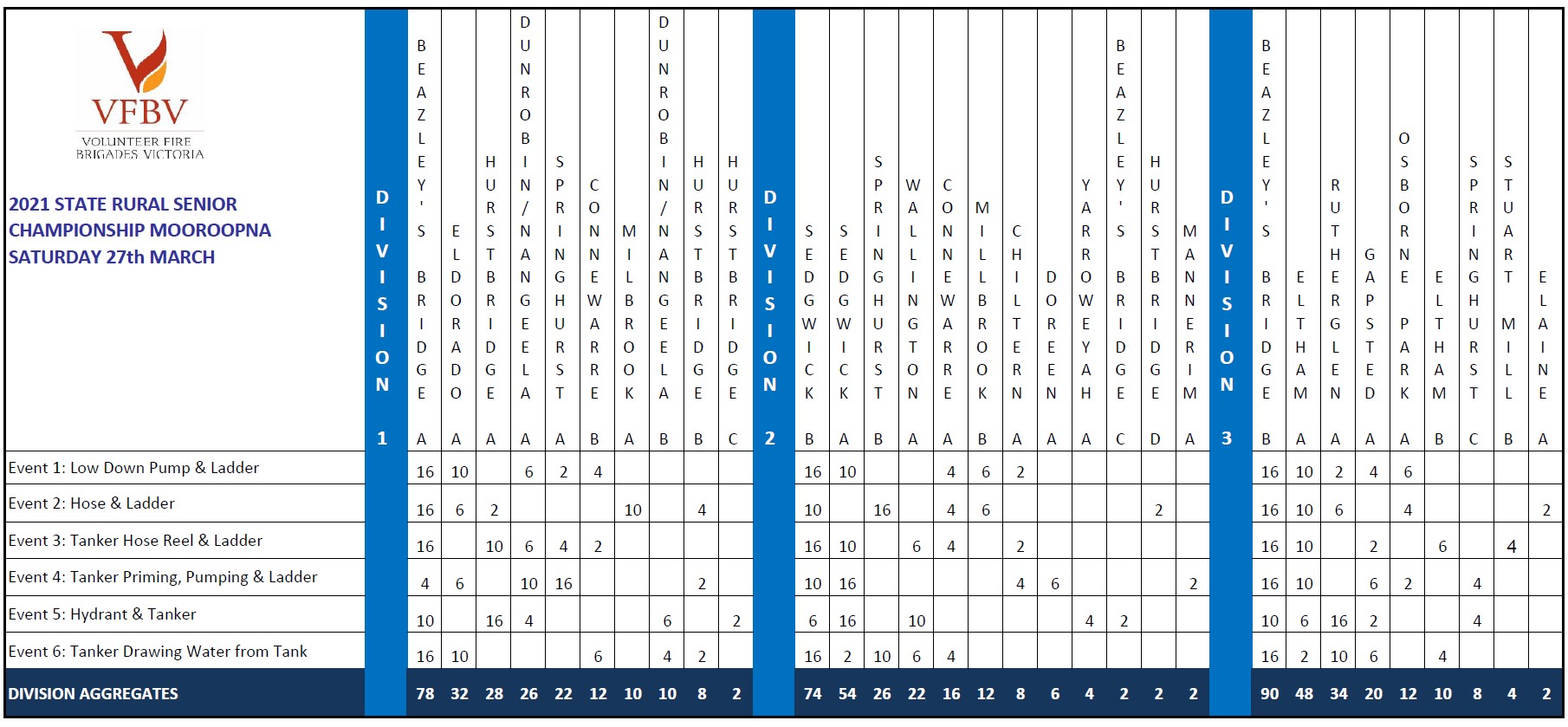
The place getters for each event and aggregate board are also available for download below.
The Acting Minister for Police and Emergency Services the Hon Danny Pearson MP has announced the outcomes for Volunteer Emergency Service Equipment Program (VESEP) for 2020/21.
VFBV congratulates the 137 CFA Brigades and Groups who were successful in their VESEP applications for grants across all categories in all districts across the State.
The annual grants program was designed by volunteers for volunteers and rewards brigades and groups for the countless hours they contribute to their keeping their communities safe.
Under the annual grants program volunteer emergency service groups are given the opportunity to apply for grants of up to $100,000 to purchase equipment including Tankers, Field Command Vehicles, Rehabilitation Units and for minor improvements to stations including refurbishments and amenities, such as kitchens and turnout rooms.
Other operational equipment that can be funded includes chainsaws, generators, quick fill pumps and portable lighting. Video Conferencing equipment, laptops and security systems were also popular items.
In addition to the Brigade and Group grants, 23 Road Crash Rescue Brigades will benefit with ancillary equipment and software provided through the Statewide Initiatives funding allocation.
It is also a good time for Brigade and Group Management Teams to start considering if there is a project they may wish to apply for a VESEP grant in the future, the VFBV VESEP Application Help pack provides some helpful tips and information that you can use to start thinking and preparing for future applications.
VFBV congratulates all the successful Brigades and Groups who were successful in obtaining a VESEP grant in 2020/21, you can download a list of the successful brigades and groups below.
Final results for the 2021 State Urban Junior Championships held in Mooroopna on Saturday 20 and Sunday 21 March 2021 are now available.
Grand Aggregate Results:
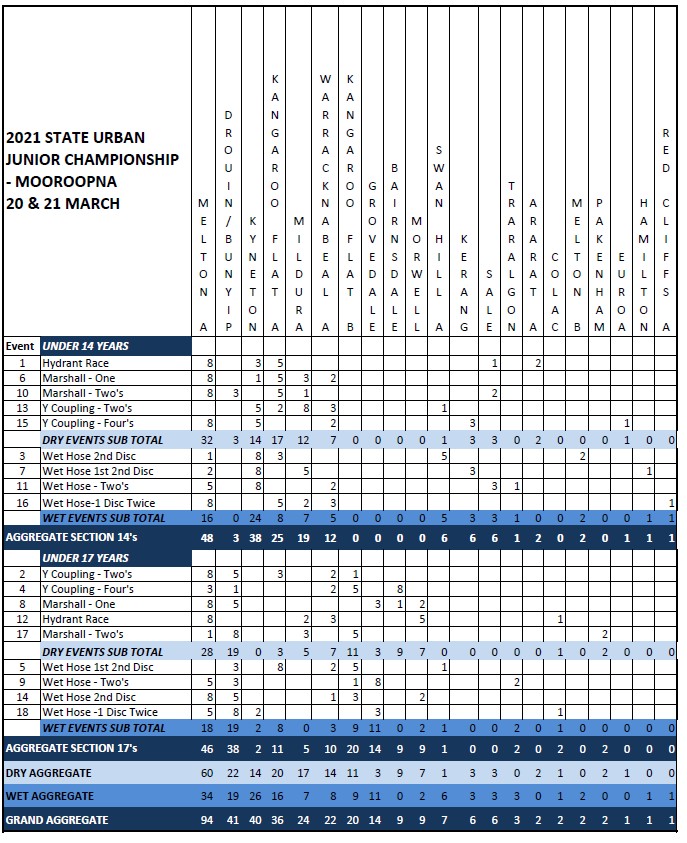
2021 Champion Team - Melton A
Melton A coaches are Anthony Rhodes, Bailey Rhodes, Ashley Goudie, and competitors:
1. Bayllie Arandt
2. Devante Johns
3. Ben Geysing
4. Lorelei Geysing
5. Brodie Leitch
6. Jamie Millington
7. Manaia Robinson
8. Kon Sein
Full results from each event and photo's of presentations can be found on VFBV's dedicated Facebook page https://www.facebook.com/Volunteer-Fire-Brigades-Victoria-Championships-451309545285820/
The place getters for each event and aggregate board are also available for download below.
Stay Connected and Involved
By Adam Barnett, VFBV Chief Executive Officer
It is normally this time of year that I reflect on the current Fire Season as we enter the home stretch of our summer fire danger period.
And while it has been milder, I want to acknowledge the significant contribution many of you have made over recent months and will continue to make. Thank-you for your service, dedication and stewardship of our communities safety.
And while a milder season infers a slower tempo, one only needs to look at how COVID-19 has impacted on many of the everyday things we once took for granted to appreciate the extra workload that brigades, and groups have had to contend with. It is a testimony to your ability to adapt with a minimum of fuss that speaks measures about CFA volunteers dedication to public safety and their desire to just get on with it. Well done and thank-you.
NEW CFA CEO
Over recent weeks we have formally welcomed Natalie MacDonald as CFA’s new Chief Executive Officer, who took over from Acting CEO Cath Greaves at the end of February.
Natalie comes to us from La Trobe University where she was the Vice-President of Strategy and Development. She has also previously worked as Director-General of the Queensland Government’s Department of Housing and Public Works and worked for the Queensland Ambulance Service as head of Corporate development.
On behalf of the VFBV Board, State Council and members I welcome Natalie to the role and commit on behalf of the whole VFBV family that we will provide her our full support.
I along with many of you want to see a strong CFA, one that is ready and stepping up to lead the work that needs to be done to reaffirm the critical role that CFA plays in our communities. A proudly volunteer service, that is deeply connected to our communities and capably supported by its dedicated, passionate and committed staff.
I want to acknowledge that for many, this will feel like yet just another change on the revolving door of CFA leadership over recent years that has contributed to low morale, change fatigue and widespread instability within the organisation.
Conversely, I hasten to add that a new leadership team selected to suit the changed environment may yet be a strength, and we should embrace the fact that this finally draws a line under all the temporary senior leadership positions filled only in an acting capacity for far too long. Over recent months we have seen the permanent appointment of a new CFA Chair, CEO and Chief Officer.
My hope is that this now brings much needed stability and sets the organisation up for success. And as I have previously stated, I have been impressed so far by CFA’s new Chair Greg Wilson, and our new Chief Officer Jason Heffernan, and my hope is that these appointments signal that CFA is moving from strength to strength, and determinedly moving forward and pivoting to the changed environment.
To add to my optimism, my first interactions with Natalie have been exceptionally good, and I have been deeply impressed by her approach, questions, and desire to understand not just what makes CFA tick (or not) but also seeking to understand the how and why.
My first impression is of someone who shares with us a deep love and connection to our communities, understands that CFA is a ‘people’ organisation, the importance of our front line and the critical importance of our brigades and the need to support them to be the best they can be.
I also commend her first priority was to start visiting brigades and join the Chief on his early tours across the State which again emphasises the importance of our people and how we deliver our services at the coal face within our communities.
This all bodes well, and I am looking forward to continuing to work with Natalie as she settles in.
THANK-YOU
I also want to take this opportunity to say a public thank-you to Cath Greaves who was CFA’s Acting CEO since June last year. In a short period of time, she won both my respect and admiration for her vision and the transformation journey to pivot corporate CFA to its changed operating environment. Her commitment to ensuring volunteers were reintegrated into the organisation’s leadership DNA was outstanding.
Her work to have their voices present in all leadership discussions was both refreshing and inspirational. And her commitment to start rebuilding the consultative arrangements between CFA and the association will be critical to ensuring the CFA leadership is connected to the dreams and aspirations of CFA volunteers and better positions the executive to actively fix and resolve the many issues that challenge us.
Cath made me a promise when she first started, and that was that she didn’t want to be a seat warmer and wanted to make every day count. And when I asked why she took on the role, she told me how much she had admired CFA for a long time, and she too wanted to make a difference.
I have no hesitation in affirming to each of you that in my mind - she did exactly that, and I have been very supportive of the work she has done, and deeply admire the passion and commitment she made to try and make CFA the best it possibly can.
My only disappointment is she will not see the benefits of what she has started. But I am buoyed by the final paragraphs in her farewell message to the membership which said:
“CFA is about to enter into its most rewarding phase yet, and I am incredibly excited about what will be achieved under Natalie and Jason’s collective leadership.”
“I shall miss you all, and CFA greatly, however I will always carry part of this great organisation with me. I will delight in looking in from the sidelines to see CFA flourish – to become the exemplar of a community-based, volunteer emergency service where members work together for the protection of our community. Thank you all for your extraordinary commitment and support.”
And while I shall miss Cath and wish her every success, I similarly feel positive about the next steps ahead of us. I say this to provide you some confidence that I think some really good ground work has been laid and we don’t start with Natalie from a blank sheet of paper.
For those of you tired of the changes, stick in there and lean on those of us who still have enough energy and enthusiasm for another lap. It’s only natural there will be peaks and troughs in what for many of you is a lifelong commitment to an organisation that literally changes people’s lives. Remember why you joined and keep your heads up.
CHILD SAFETY
And thank-you to all members, brigades, groups and district councils that contributed to feedback on CFA’s proposed child safety policies and procedures.
There was a high level of support and consensus for the majority of proposed changes, with an overwhelming majority of support for the introduction of mandatory working with children checks for all new CFA volunteers and staff.
VFBV has provided CFA with comprehensive feedback based on your input. And the VFBV Board has reinforced that it shares with CFA a commitment to child safety and ensuring the child safe standards and principles are embedded across the whole organisation.
There were two aspects of the changes that received overwhelming negative feedback and criticism from volunteers, and which the VFBV Board has agreed to campaign for change.
The first is that VFBV categorically rejects the proposed exclusion of FRV seconded personnel from needing to comply with the new working with children check procedure. And while we acknowledge the difficult industrial relations environment present, volunteers were adamant that CFA has a moral as well as a legal responsibility to pursue other means of achieving organisation-wide child safe policies to protect our children in line with the relevant child safe legislation.
VFBV has also not supported the proposed procedure to deal with adverse notices, echoing the concerns raised by volunteers about the lack of confidence in CFA’s existing privacy and confidentiality processes, but also raising concerns with the lack of procedural fairness. Child safety is too important to let potential administrative error undermine people’s confidence, and are issues we pledge our full attention to resolving.
In welcome developments, CFA has agreed to a VFBV request to form a small working party to work together on a revised procedure that addresses these shortfalls and provides a foundation for a new draft procedure to further consult on.
This demonstrates our approach and commitment in always trying to work positively with CFA in the first instance to influence change, and I am hopeful that CFA’s fast acknowledgment and offer to work further with us to adapt their draft policies and procedures based on volunteer feedback is a sign of positive things to come.
Stay safe and keep connecting and being involved.
March 2021 Quarterly Supplement
Included in the March 2021 edition of Fire Wise was the sixth edition of the VFBV Quarterly Supplement.
The Quarterly Supplement contains 16 pages of relevant news, updates and information on current issues being pursued by VFBV on behalf of members. It also includes links to additional resources or updates that are available via our website.
An electronic copy of the Quarterly Supplement can be downloaded here.
Brigade Captains and Secretaries, Group Officers and Group Secretaries as well as VBFV delegates are requested to please take the time to read this and future editions, and to table at your upcoming meetings for the benefit and knowledge of your members.
Volunteers – Uncovering the hidden value
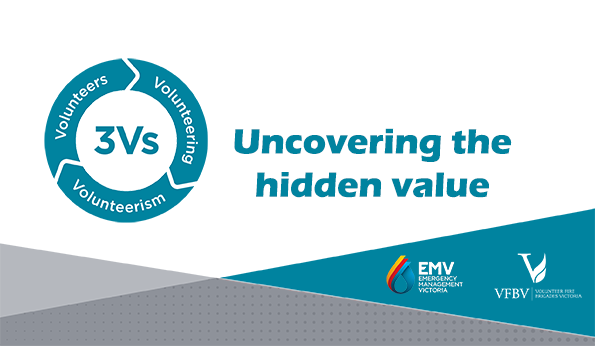
Victoria's Emergency Management Volunteers contribute a conservative indicative value of $1.9 - $2.5 billion dollars of value to Victoria every year.
VFBV has worked tirelessly alongside our partners at the Victoria State Emergency Service Volunteer Association (VicSESVA), Ambulance Victoria, St John Ambulance, the Victorian Council of Churches Emergency Ministry and Emergency Management Victoria (EMV) to research and report on the value of Victoria's emergency management volunteers, volunteering and volunteerism. This project is referred in shorthand, as the 3V's. (Volunteers - Volunteering - Volunteerism.)
The 3V's project has involved exploring additional ways to analyse the value of Victoria’s emergency management volunteers, volunteering and volunteerism. It has provided a framework and model that illustrates various layers of value, and explores the breadth of that value at the local community level. It was sponsored by the Volunteer Consultative Forum (VCF) which VFBV is a founding member of, and worked with Lateral Economics to produce a fresh and original perspective to this unique task using fit for purpose logic, structure and evidence.
The full Final Report, and the Interim Report (published in 2017) are both available for download from the VFBV website.
The reports discuss the 'hidden value' that arises incidentally from the 3Vs that might not otherwise be known, captured and hence appreciated. It aims to bring this value to life through a new way of talking about volunteers, their activities and impact on society, while being accurate and credible.
The 3Vs Final Report presents a simple logic for how the 3Vs generate value to Victorians. Volunteers undertake activities which have positive outcomes or ‘value’, and value can be described in different ways. Describing value in its diversity allows the State to recognise and build on the value accrued by Victorian communities from the 3Vs. In this way, the 3Vs can be conceived not only as an emergency management workforce and a mechanism for building emergency related community resilience, but also as a way to strengthen communities.
Even a preliminary analysis of this kind shows that the value of volunteers is large, and widely distributed across the community. Discussing the size of the 3Vs’ value puts in stark contrast the flip-side of the issue: the possible losses and risk to Victoria from lower 3Vs activity.
VFBV commends these reports to not only volunteers themselves, but emergency management stakeholders, policy makers and the Victorian public in general.
Visible, active, positive emergency volunteerism in a community can make a difference to society as a whole. This difference has both tangible and intangible aspects. Emergency Management Volunteers are fundamental to emergency management in Victoria. It is therefore critical that their value and importance be recognized, and their collective interests and needs be protected, encouraged and supported to ensure they can deliver their services safely and effectively for the benefit of the Australian community.
Read more about the 3V’s final report on the VFBV website.
Hamilton Air Base volunteer to be honoured
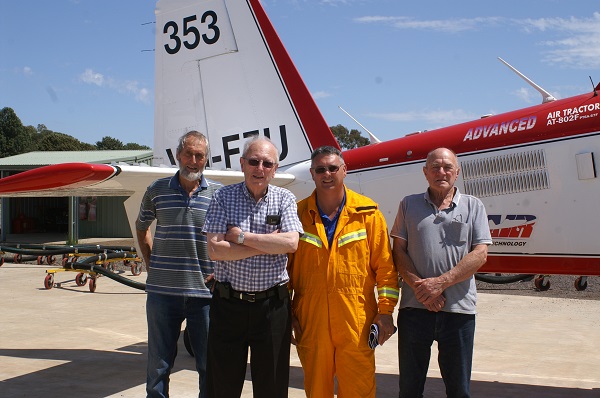
VFBV Media Release - March 2021
Volunteer fire fighting in the Hamilton and Dunkeld regions has lost one of its most dedicated supporters in Leighton Wraith but his legacy will live on.
Mr Wraith, the driving force behind the volunteer-run Hamilton CFA-EMV Air Base and a CFA volunteer for more than 40 years, has died at his home near Dunkeld, aged 81.
Earlier this year Mr Wraith was awarded an Australian Fire Service Medal (AFSM) to recognise his long and outstanding service to CFA and his local community. His contribution will be remembered with plans to name a loading facility at the airbase in his honour.
Mr Wraith, a farmer and licenced pilot, was a volunteer with Bochara and Dunkeld Fire Brigades for 40 years and more recently led the Hamilton CFA-EMV Air Base.
Long-time friend Don Robertson said that Mr Wraith had been a major contributor to the region over many years, highlighted by his efforts to establish and maintain the air base.
Mr Robertson, a former shire councillor and mayor, CFA Board member and Volunteer Fire Brigades Victoria (VFBV) district chair, accompanied Mr Wraith to Canberra and Melbourne to campaign for the base.
“Without Leighton, we wouldn’t have an air base here,” he said. “It wasn’t really a shire issue, but we could all see the need for it.”
CFA District 5 Airbase commander Brett Gladki said the decision to name the loading facility in honour of Mr Wraith was driven by his fellow volunteers and recognised his dedication to the facility.
“Leighton lobbied very hard to get this new loading facility which runs like a well-oiled machine,” Mr Gladki said. “Previously the gear and the operators were exposed to the elements but this encloses everything and makes the whole process of loading aircraft more efficient and more comfortable.”
Mr Gladki said naming the loading facility in honour of Leighton recognised his dedication to the airbase. “He really drove this project and was the number one person in getting it off the ground,” he said.
“The naming is very much driven by Leighton’s peers at the airbase and the volunteers who spent many years working with him.”
A sign is being created and will be unveiled at a later date.
Volunteer Fire Brigades Victoria (VFBV) CEO Adam Barnett said Mr Wraith’s commitment showed how CFA volunteers could contribute in different ways at different stages of their lives and the facility naming was well deserved.
“Leighton’s dedication over 40 years with his local brigades and then with the air base was of huge benefit to his community and the region and he will be sadly missed. We pass on our best wishes to his family, friends and loved ones.
“Leighton has left an incredibly powerful legacy. The work he has done has saved countless lives and will continue to protect Victorians for decades to come.”
There are 15 other air bases in Victoria run by DELWP. Located at the Hamilton airport, the air base has 40 volunteers whose main tasks are to have water, foam or retardant ready and to load planes. They are usually needed about 30-40 times each summer.
Two bomber aircraft are permanently based at Hamilton over summer, plus two support aircraft, and the base has access to bombers from Casterton and Stawell.
Volunteers come from different brigades around the Hamilton region, sometimes performing dual roles for their local brigade and the air base. Most are retired or mature-aged farmers. “We’re so lucky; whatever needs fixing they can do it,” Mr Wraith said in 2019. “These guys are old-fashioned farmers who can do anything and fix anything.”
Mr Wraith had been recruited about eight years ago by the regional CFA operations manager to find volunteers to set up the base which is primarily responsible for a 22,000 square kilometre region stretching from Peterborough and Warrnambool, to near Balmoral and Glenthompson.
Mr Wraith said in 2019 that many of the volunteers had been active firefighters for decades but no longer wanted to be in the field.
“They’ve had a lifetime on the back of a truck and in strike teams,” Mr Wraith said. “They’ve had enough of that but still want to be involved so this keeps them active and in the CFA. We firmly believe we are contributing to the bigger picture to protect not only our own patch but the whole of the west, south-west and north-west of Victoria.”
Nominations for Trust Fund
The VFBV Board is calling for nominations to the CFA and Brigades Donations Trust Fund.
Following nominations, five new or reappointed members will be appointed by the VFBV Board to serve as VFBV trustees on the Trust Fund for a term of two years. The Trust Fund committee normally meets quarterly, either via teleconference or at CFA HQ.
Nominations close Friday 11th June 2021 and can be mailed to VFBV office, 9/24 Lakeside Drive, Burwood East 3151 or emailed to This email address is being protected from spambots. You need JavaScript enabled to view it.
International Women’s Day
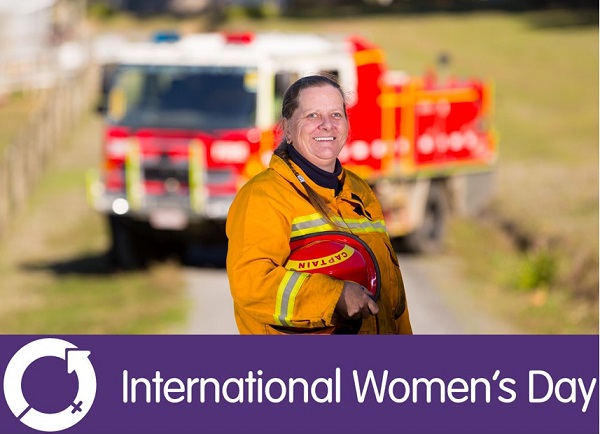
International Women’s Day is celebrated each year on March 8, and is a global celebration of the social, economic, cultural and political achievements of women while also being a call to action for accelerating gender parity.
This International Women’s Day, VFBV celebrated the women who contribute so much to VFBV, CFA, emergency services and their communities.
The theme for International Women’s Day in 2021 is “Choose to Challenge” – where a challenged world is an alert world, and from challenge comes change. Each day the more than 12,000 female CFA volunteers challenge the stereotype of what a firefighter is and how women can be involved in any and all emergency services, while also leading the way for future generations.
Thank you to all the fabulous, dedicated, highly skilled and much appreciated women in the CFA and across all fire and emergency services.
2021 State Championships approaches
Time is fast approaching for the State Championships at Mooroopna later this month – the Urban Juniors on the weekend of 20th and 21st March, and the much anticipated event on the weekend of 27th and 28th March which will showcase the Urban Seniors and the Rural Seniors & Rural Juniors being conducted simultaneously alongside each other at the same venue, for the first time in competition history.
Numbers of teams are down this year as expected, primarily due to COVID delaying the commencement of training and competitions being held, but numbers are still good with so far 41 teams entered to compete at the Urban Juniors on the 20th and 21st March and, in total, 87 Senior teams and 33 Junior teams entered to compete the weekend of 27th and 28th March.
The State Championships Committee, which consists of CFA management, members of both VFBV Rural and Urban State Committees and staff, has worked extremely hard in all the preplanning, preparation and management for these events, to which has been added an extra workload in ensuring the events comply with the Government’s COVIDSafe requirements, and VFBV thanks all those involved for their contribution and efforts.
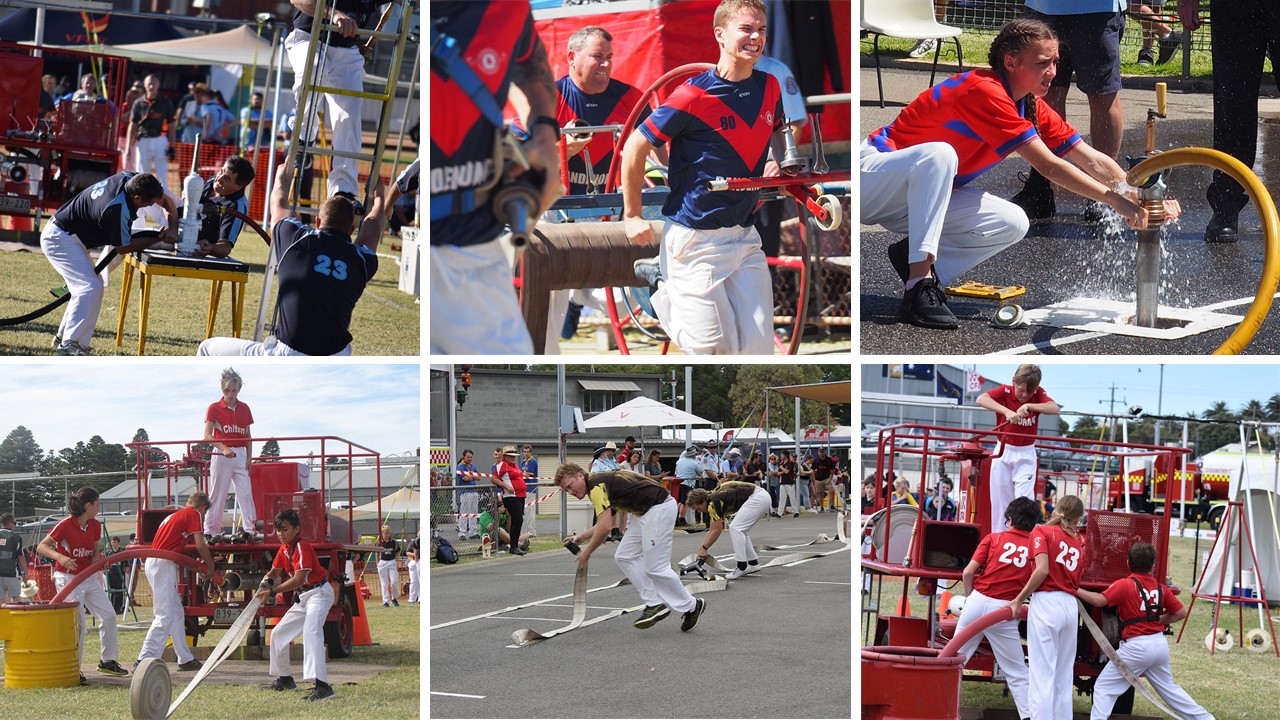
Mental Health Matters Workshops

The Mental Health Matters one-day program, hosted by ESF with support from the State Government, will bring together volunteers from across Victoria’s emergency service sector to discuss how we can better promote and support good mental health in an emergency services environment.
The workshops will be facilitated by experienced mental health professionals from OzHelp , alongside guests who will share their lived experience of working in the emergency services sector.
The one-day event is designed to provide participants with a deeper understanding of the many factors that influence our mental health and wellbeing; educating on how to apply these learnings in caring for ourselves and our colleagues in a volunteer team environment.
Participants will leave the workshops
• Knowing the role of leaders [formal and informal] to support the mental health and wellbeing of a team
• Able to recognise factors which contribute to stress in a workplace
• Able to recognise early indicators of distress in themselves
• Able to recognise early indicators of distress in colleagues
• Confident in being able to start conversations about mental health and wellbeing with colleagues
• Knowing where to access mental health support and resources
Workshop dates and locations and how to apply to attend can be found on the VFBV website.
Recent articles on the VFBV website
Hamilton Air Base volunteer to be honoured
Volunteers – Uncovering the hidden value
International Women’s Day 2021
Mental health support is available for CFA volunteers and other Victorian emergency workers
Information for brigades competing in the 2021 State Championships – Urban Juniors, Urban Seniors and Rural State Championships
Enjoy the VFBV monthly newsletter
If you enjoy reading the VFBV newsletter each month, why not share it with your fellow volunteers?
Either share this page with others who may enjoy the articles or encourage other volunteers to sign up to receive their own copy via email each month here.
The Mental Health Matters one-day program, hosted by ESF with support from the State Government, will bring together volunteers from across Victoria’s emergency service sector to discuss how we can better promote and support good mental health in an emergency services environment.
The workshops will be facilitated by experienced mental health professionals from OzHelp , alongside guests who will share their lived experience of working in the emergency services sector.
The one-day event is designed to provide participants with a deeper understanding of the many factors that influence our mental health and wellbeing; educating on how to apply these learnings in caring for ourselves and our colleagues in a volunteer team environment.
Participants will leave the workshops:
• Knowing the role of leaders [formal and informal] to support the mental health and wellbeing of a team
• Able to recognise factors which contribute to stress in a workplace
• Able to recognise early indicators of distress in themselves
• Able to recognise early indicators of distress in colleagues
• Confident in being able to start conversations about mental health and wellbeing with colleagues
• Knowing where to access mental health support and resources
Workshops will take place as follows:
Saturday 17 April – Ballarat
Sunday 18 April – City of Melton
Saturday 1 May – Bendigo
Sunday 2 May – Horsham
Saturday 8 May – Wodonga
Sunday 9 May – Seymour
Saturday 15 May – Warrnambool
Sunday 16 May – Geelong
Saturday 22 May – Lilydale
Sunday 23 May – Frankston
Saturday 29 May – Bairnsdale
Sunday 30 May – Traralgon
Register by going to the Emergency Service Foundation website.
VFBV Media Release - March 2021
Volunteer fire fighting in the Hamilton and Dunkeld regions has lost one of its most dedicated supporters in Leighton Wraith but his legacy will live on.
Mr Wraith, the driving force behind the volunteer-run Hamilton CFA-EMV Air Base and a CFA volunteer for more than 40 years, has died at his home near Dunkeld, aged 81.
Earlier this year Mr Wraith was awarded an Australian Fire Service Medal (AFSM) to recognise his long and outstanding service to CFA and his local community. His contribution will be remembered with plans to name a loading facility at the airbase in his honour.
Mr Wraith, a farmer and licenced pilot, was a volunteer with Bochara and Dunkeld Fire Brigades for 40 years and more recently led the Hamilton CFA-EMV Air Base.
Long-time friend Don Robertson said that Mr Wraith had been a major contributor to the region over many years, highlighted by his efforts to establish and maintain the air base.
Mr Robertson, a former shire councillor and mayor, CFA Board member and Volunteer Fire Brigades Victoria (VFBV) district chair, accompanied Mr Wraith to Canberra and Melbourne to campaign for the base.
“Without Leighton, we wouldn’t have an air base here,” he said. “It wasn’t really a shire issue, but we could all see the need for it.”
CFA District 5 Airbase commander Brett Gladki said the decision to name the loading facility in honour of Mr Wraith was driven by his fellow volunteers and recognised his dedication to the facility.
“Leighton lobbied very hard to get this new loading facility which runs like a well-oiled machine,” Mr Gladki said. “Previously the gear and the operators were exposed to the elements but this encloses everything and makes the whole process of loading aircraft more efficient and more comfortable.”
Mr Gladki said naming the loading facility in honour of Leighton recognised his dedication to the airbase. “He really drove this project and was the number one person in getting it off the ground,” he said.
“The naming is very much driven by Leighton’s peers at the airbase and the volunteers who spent many years working with him.”
A sign is being created and will be unveiled at a later date.
Volunteer Fire Brigades Victoria (VFBV) CEO Adam Barnett said Mr Wraith’s commitment showed how CFA volunteers could contribute in different ways at different stages of their lives and the facility naming was well deserved.
“Leighton’s dedication over 40 years with his local brigades and then with the air base was of huge benefit to his community and the region and he will be sadly missed. We pass on our best wishes to his family, friends and loved ones.
“Leighton has left an incredibly powerful legacy. The work he has done has saved countless lives and will continue to protect Victorians for decades to come.”
There are 15 other air bases in Victoria run by DELWP. Located at the Hamilton airport, the air base has 40 volunteers whose main tasks are to have water, foam or retardant ready and to load planes. They are usually needed about 30-40 times each summer.
Two bomber aircraft are permanently based at Hamilton over summer, plus two support aircraft, and the base has access to bombers from Casterton and Stawell.
Volunteers come from different brigades around the Hamilton region, sometimes performing dual roles for their local brigade and the air base. Most are retired or mature-aged farmers. “We’re so lucky; whatever needs fixing they can do it,” Mr Wraith said in 2019. “These guys are old-fashioned farmers who can do anything and fix anything.”
Mr Wraith had been recruited about eight years ago by the regional CFA operations manager to find volunteers to set up the base which is primarily responsible for a 22,000 square kilometre region stretching from Peterborough and Warrnambool, to near Balmoral and Glenthompson.
Mr Wraith said in 2019 that many of the volunteers had been active firefighters for decades but no longer wanted to be in the field.
“They’ve had a lifetime on the back of a truck and in strike teams,” Mr Wraith said. “They’ve had enough of that but still want to be involved so this keeps them active and in the CFA. We firmly believe we are contributing to the bigger picture to protect not only our own patch but the whole of the west, south-west and north-west of Victoria.”
Pictured: Leighton Wraith is second from left with fellow volunteers at the Air Base in 2018.
Victoria's Emergency Management Volunteers contribute a conservative indicative value of $1.9 - $2.5 billion dollars of value to Victoria every year.
VFBV has worked tirelessly alongside our partners at the Victoria State Emergency Service Volunteer Association (VicSESVA), Ambulance Victoria, St John Ambulance, the Victorian Council of Churches Emergency Ministry and Emergency Management Victoria (EMV) to research and report on the value of Victoria's emergency management volunteers, volunteering and volunteerism. This project is referred in shorthand, as the 3V's. (Volunteers - Volunteering - Volunteerism.)
The 3V's project has involved exploring additional ways to analyse the value of Victoria’s emergency management volunteers, volunteering and volunteerism. It has provided a framework and model that illustrates various layers of value, and explores the breadth of that value at the local community level. It was sponsored by the Volunteer Consultative Forum (VCF) which VFBV is a founding member of, and worked with Lateral Economics to produce a fresh and original perspective to this unique task using fit for purpose logic, structure and evidence.
The full Final Report, and the Interim Report (published in 2017) are both available for download at the bottom of this page.
The reports discuss the 'hidden value' that arises incidentally from the 3Vs that might not otherwise be known, captured and hence appreciated. It aims to bring this value to life through a new way of talking about volunteers, their activities and impact on society, while being accurate and credible.
The 3Vs Final Report presents a simple logic for how the 3Vs generate value to Victorians. Volunteers undertake activities which have positive outcomes or ‘value’, and value can be described in different ways. Describing value in its diversity allows the State to recognise and build on the value accrued by Victorian communities from the 3Vs. In this way, the 3Vs can be conceived not only as an emergency management workforce and a mechanism for building emergency related community resilience, but also as a way to strengthen communities.
Even a preliminary analysis of this kind shows that the value of volunteers is large, and widely distributed across the community. Discussing the size of the 3Vs’ value puts in stark contrast the flip-side of the issue: the possible losses and risk to Victoria from lower 3Vs activity.
VFBV commends these reports to not only volunteers themselves, but emergency management stakeholders, policy makers and the Victorian public in general.
Visible, active, positive emergency volunteerism in a community can make a difference to society as a whole. This difference has both tangible and intangible aspects. Emergency Management Volunteers are fundamental to emergency management in Victoria. It is therefore critical that their value and importance be recognized, and their collective interests and needs be protected, encouraged and supported to ensure they can deliver their services safely and effectively for the benefit of the Australian community.
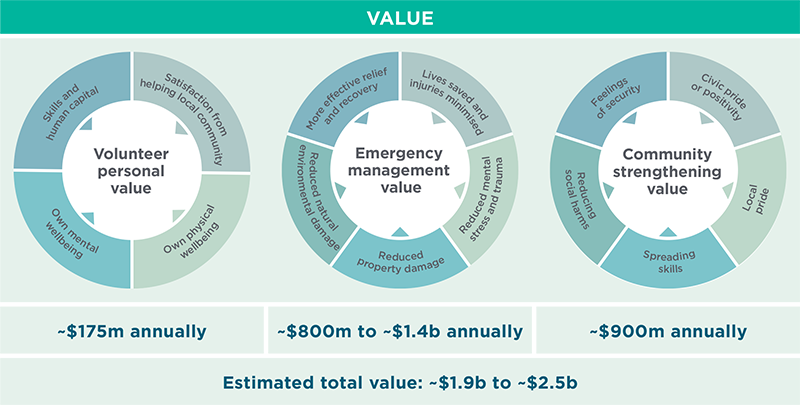
Excerpts from the reports:
3Vs - Volunteers, Volunteering and Volunteerism
It is estimated that approximately 100,000 Victorians contribute their time, skills and resources to ongoing volunteer work in local communities before, during and after emergencies. While it is helpful to know how many people volunteer, it provides no real insight, evidence or facts about the value that volunteers are providing to the state of Victoria.
The 3V’s Final Report: Uncovering the hidden value was developed by the Volunteer Consultative Forum (VCF) and supported by Emergency Management Victoria (EMV) to bring to life the value of the three V’s associated with volunteering within emergency services: volunteers, volunteering and volunteerism. This final report builds on the 3V’s interim report released in August 2017 and provides further evidence of the value generated by Victoria’s emergency management volunteers, volunteering and volunteerism and also a framework and model that identifies three layers of value: volunteer personal value; emergency management value; and community strengthening value. Both the final report and the interim report are available for download at the bottom of this page.
The value created by Victoria’s emergency volunteers, volunteering and volunteering is estimated at between $1.9 billion to $2.5 billion annually.
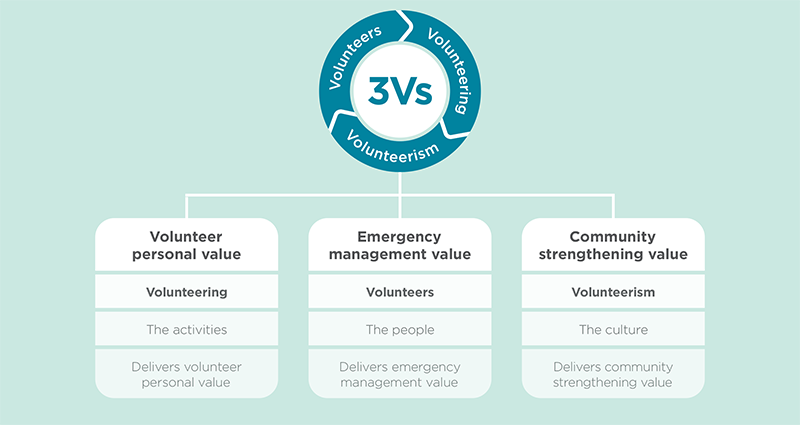
Defining the value
The 3V’s project developed a simple logic to explain how the 3V’s generate value to the Victorian community.

Where resources and inputs can include time, established working relationships, local knowledge, accrued skills and physical capability. Each of these are applied to undertake activities and outputs. These activities and outputs can be defined both in terms of emergency management, for example training sessions, responding to incidents, community safety, and in more general ways such as bringing a group together to work cooperatively towards a shared goal.
Activities and outputs have a positive outcome on someone or something which can define the value of the activity, this value can vary significantly in size depending on what would have otherwise occurred if not for the volunteer having input into the situation.
The Interim Report identified six types of value alongside the economic value that is often captured or referred to, each of these values span a wide range of beneficiaries and contribute to community resilience, the six types of value are:
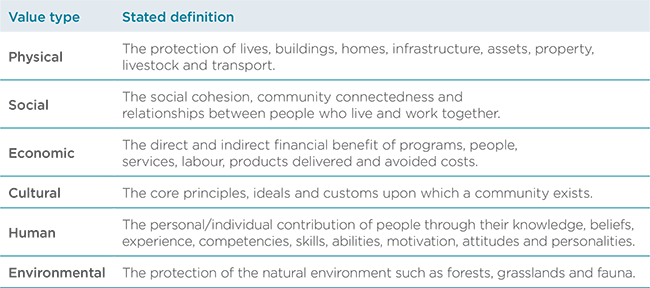
Each of these values aligns with one or more of the three concurrent layers of volunteering identified by the 3V’s Project, the three layers are briefly explained further below and more detailed explanations of the values can be found in the report available for download at the bottom of this page.
1. Volunteer Personal Value
The volunteer personal value refers to volunteering as the activity itself, the work that volunteers are doing before, during and after emergencies.
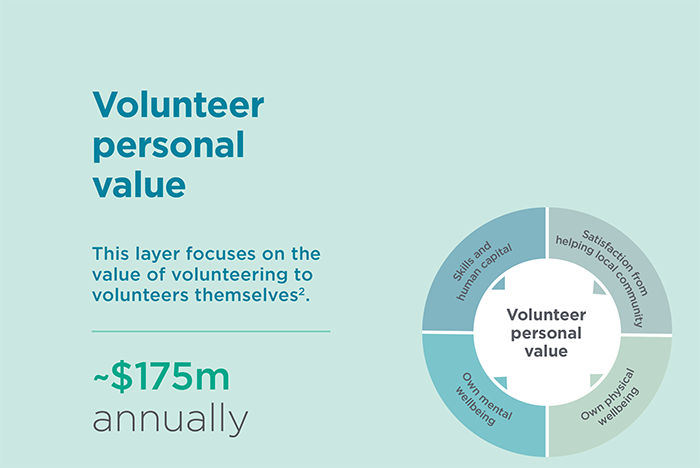
2. Emergency Management Value
The emergency management value layer refers to the volunteers who are the dedicated people who do the work in local communities before, during and after emergencies.

3. Community Strengthening Value
This layer relates to the value that the culture within the organisations and the culture within the community that volunteers provide value to, communities may feel a greater sense of safety and security knowing that volunteers are ready and able to assist.
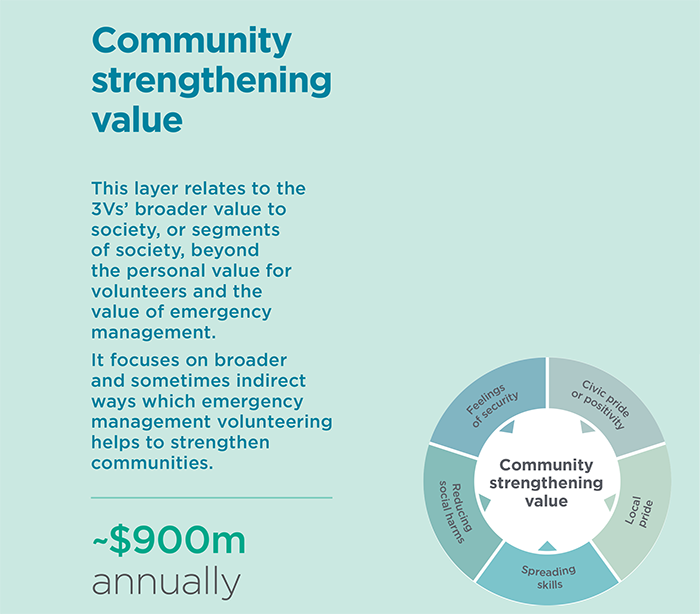
The 2017 Interim report also explored the characteristics of resilience, and produced the conceptual model below to illustrate the links between them:
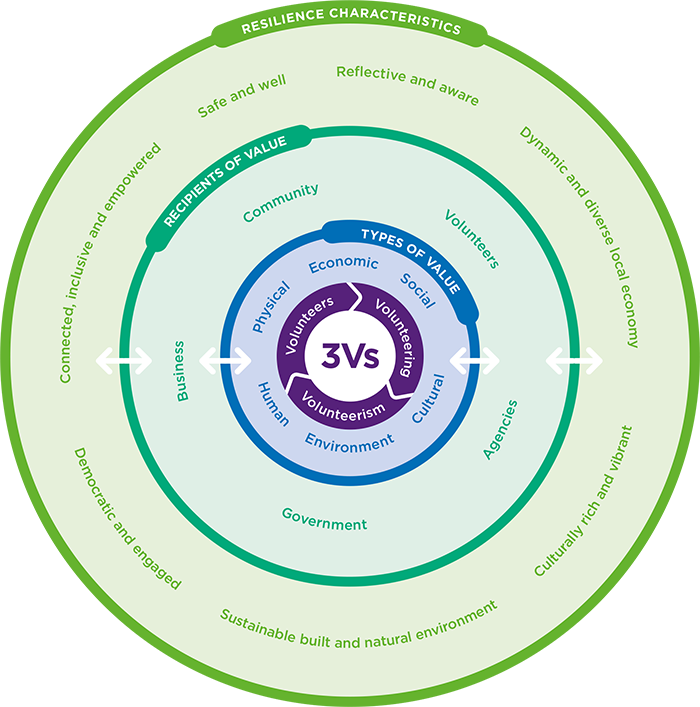
There is much to be proud of when presenting the value of 100,000 emergency management volunteers, the activities they provide and the spirit in which they work with and on behalf of Victorian communities.
Volunteers require respect, recognition and a purpose for them to continue to be engaged. Training, volunteer support and operational utilisation are also critical factors in retaining them and maintaining operational readiness for deployment.
Historical evidence demonstrates that when volunteer roles are diminished or they feel their contribution is no longer valued or respected, they disengage.
A cradle to grave volunteer model ensures flexibility to account for changes in lifestyle and career/family changes, or life pressures such as starting a family or new business. A flexible model that buffers this ebb and flow of availability is key to its long-term success and sustainability.
Recruitment, retention and respect go hand in hand with ensuring Victoria has a volunteer pool strong and resilient enough to meet future peak load demands. Volunteers must have meaningful roles to motivate and encourage them.
All recent inquiries and commissions have recognised the fundamental importance of the current volunteer arrangements. The need for trained, experienced volunteers is growing. Already one of the most wildfire prone areas in the world, Victoria faces the twin challenges of a rapidly growing population and increased urbanisation within an expanding metropolitan Melbourne and regional cities.
Volunteers are calling for bi-partisan support for initiatives that protect, encourage, support and strengthen Victoria’s emergency management volunteer surge capacity to best prepare Victoria for future disasters.
VFBV commends the 3V reports to not only volunteers themselves, but emergency management stakeholders, policy makers and the Victorian public in general and encourages you to read and explore the contents contains within.
Strong Volunteerism, Embraced to Build Community Resilience for a Safer Victoria.
This International Women’s Day, VFBV wants to celebrate the women who contribute so much to VFBV, CFA, emergency services and their communities.
The theme for International Women’s Day in 2021 is “Choose to Challenge” – where a challenged world is an alert world, and from challenge comes change. Each day the more than 12,000 female CFA volunteers challenge the stereotype of what a firefighter is and how women can be involved in any and all emergency services, while also leading the way for future generations.
Thank you for today and every day to all the fabulous, dedicated, highly skilled and much appreciated women in the CFA and across all fire and emergency services.
Lets all work together to encourage women challenge what it means to be a volunteer with CFA, together we can all make a difference.
About International Women’s Day
International Women’s Day is celebrated each year on March 8, it is a global celebration of the social, economic, cultural and political achievements of women while also being a call to action for accelerating gender parity.
The first International Women’s Day gathering occurred in 1911, you can read more about the history of International Women’s Day on the International Women’s Day website.
IGEM Fire Season Inquiry Community Meetings Postponed
Written by VFBVThe Inspector-General for Emergency Management has advised that they will be postponing the following Victorian Fire Season Inquiry community meetings scheduled for 15–17 February in accordance with today’s (12 February 2021) statement from the Premier:
- Orbost - Monday 15 February, 6.00pm
- Orbost - Tuesday 16 February, 10.00am - Small business owners/operators
- Cabbage Tree Creek - Tuesday 16 February 1.00pm
- Mallacoota - Tuesday 16 February, 6.00pm
- Genoa - Wednesday 17 February, 10.00am
-Wairewa - Wednesday 17 February, 2.30pm
The decision to postpone these meetings was difficult but reflects the advice of public health experts, that the whole of Victoria will move to ‘circuit-breaker action’ from 11:59pm tonight until 11:59pm on Wednesday, 17 February.
The Inspector-General will do everything possible to make alternative arrangements for these six community meetings and details once available will be made accessible through our website www.igem.vic.gov.au, and promoted through, Facebook (@IGEMVictoria) and Twitter (@IGEM_Vic).
For health information and further information about the ‘circuit breaker action’ please visit this website https://www.dhhs.vic.gov.au/coronavirus
Photo: Growing Back East Gippsland
Prep to Grade 6 Lakes Entrance Primary School
"Students from Prep to Grade 6 completed their own piece of artwork and collated them all into a collaborative piece. We chose a rainbow to represent the hope we share of our region gaining back its strength in all the areas we have had loss."
Tapping into our pioneering spirit
By Adam Barnett, VFBV Chief Executive Officer
Thank-you to all members who participated in our most recent annual VFBV Volunteer Welfare and Efficiency Survey.
The survey officially closed last month, and with well over 2,500 CFA volunteers participating, and over 5,500 fire service volunteers Australia wide - the survey remains one of the highest and most reliable samples of volunteer emergency service opinion and satisfaction metrics in the country.
And while analysis has only just commenced - sadly - early results indicate a continued decline in CFA volunteer satisfaction across several key areas.
The worst two performing areas contributing the most to volunteer dissatisfaction are again volunteer consultation (or the lack thereof) and training.
One of the early take-aways from the initial analysis is to consider that at the time of the survey, fire services reform implementation was about halfway through its first year and there had been significant promotion of a renewed focus by CFA leadership on the importance of volunteer engagement and consultation. And while this work may have only just started and therefore you would not expect it to significantly affect this year’s results, I would urge decision makers to reflect on the absence of any apparent ‘placebo’ affect whatsoever.
As expected, “reform” and the new arrangements have most certainly not provided a silver bullet, magic pudding or any discernible ‘honeymoon’ period thus far.
This confirms our experience that volunteers are tuning out the rhetoric and are looking for real and tangible outcomes that are proof of change, not just promises of change.
In many people’s minds - deeds and actions are worth more than all the words in the land. That’s not to say we shouldn’t keep trying but this should act as a sobering reminder that the road to change will be measured by the mile, not the inch and there are rarely any shortcuts.
Anyone who has been involved in change management would have come across the mantra espoused by management consultants inc. who love to sell the allure of ‘low hanging fruit’. The theory being that a quick SWOT analysis of any problem will normally reveal some quick wins that promises quick and easy gains for very little effort while you work on the longer-term changes.
As I remarked to an earlier CFA CEO some time ago now – you can forget that snake oil. Previous leadership picked the low hanging fruit years ago, and the orchard is now bare. You’ll be lucky to find a branch let alone some fruit. There is no low hanging fruit left. Nadda, zero, zilch. Grab a ladder, roll up your sleeves and be prepared to work hard for next seasons harvest team.
Now speaking of hard work, I want to publicly acknowledge the efforts of new Chief Officer Jason Heffernan who has certainly hit the ground running.
Jason has bought a renewed passion, perspective and enthusiasm to the Chiefs office, with a healthy dose of active questioning about “why do we do it this way?” Similarly, he has prioritised talking and engaging with volunteers in the field and hearing from us firsthand about the volunteer experience of CFA but equally important - listening to volunteers hopes, dreams and aspirations. His regional tours of brigades across the State continues, and from all reports - he is leaving a great first impression.
Volunteers have embraced his unapologetic support for the volunteer ethos and his strong advocacy for volunteer empowerment, trust and respect. He is equally assertive in recognising the vital role that CFA plays in communities right across Victoria.
I have been very pleased to observe the Chief referring collectively to ‘our’ CFA, quickly graduating from interstate visitor to stalwart defender and protector of one of Victoria’s most precious resources. Thank-you Chief, well done – and keep up the good work.
But equally - we as volunteers must also embrace the change journey if we have any hope of influencing it. As volunteers we are equally responsible for the organisation’s leadership and destiny. And for those fatigued by the change journey, the bitterness and many a false start, I would ask we reflect on the proud history of volunteers being the instigators and pioneers of constant positive change and evolution of our fire service over the years. For in many ways – volunteers are in fact leading the charge in demanding change to the organisation through their feedback. If the way things are done now is causing such widespread dissatisfaction -as it clearly is - then we must commit ourselves to a change journey of fixing it and getting behind that change.
We also must acknowledge that this is going to come very hard to those that have suffered what feels like endless change that has delivered very little tangible outcomes. Change for changes sake is no real change at all. And thought bubbles from on high will not cut it. Embracing volunteers, doing change with them instead of to them – and being respectful of the nuances required to cater to a volunteer-based organization and work force is critical. As is patience, empathy and some good old fashion decency in how people should be treated, embraced and included in discussions about what those changes should be.
Like an elastic band, CFA culture will resist any change that grass root members do not get behind and commit to. The politics of division that have played out of late should also be viewed as the aberration it is. The mantra of divide and conquer has no place in our organisation and is unworthy of the public good and service provided by CFA members and something we should play no part in.
So, the challenge for all of us is not to close ourselves off to all change but rather find a way to assess the potential pros and cons of proposed changes and then decide to either get behind it or not. We shouldn’t be afraid of driving our own change also. I know you are tired, and many of you tell me you are ‘over it’. But let us be the change we want to see. Let’s not resist for resistance sake, but by the same token, if we are not behind a proposed change or see a better way – we owe it to ourselves to speak out and contribute to the discussion.
There was a contribution from Fireman Sam in the October 2009 edition of The Fireman (Fire Wise) (no 862.) The article was titled ‘Cousin Fred’s Letter.’
Keeping in mind that CFA was still very raw after the events of Black Saturday back then, it is instructive of the kind of getting back to basics thinking that should form the genesis of any future CFA improvements. The article should be required reading for anyone in CFA that is contemplating change.
In it, Cousin Fred opines that volunteering is likely to be perceived by the next generation of volunteers as a mugs game. A couple of excerpts:
“However friendly and welcoming the local brigade may be – and I think they are generally warmly so – the recruit is confronted by an obstacle course of bureaucratic requirements and impediments. She or he joined for many and varied reasons, but they include learning a set of skills and applying them – preferably usefully and to somebody’s benefit.”
“They soon discover that most of a brigade’s business is rapid-fire exchange of paperwork with HQ, agonised head scratching about the actual meaning of directives from on high and means of complying with them but seldom any hint of why it should be so.”
“If they joined with any hope of making a difference, they soon realise that, for much of the time and in most of their CFA activities, they are small, insignificant cogs in some complex machine that works in a manner even more mysterious than that of the Almighty to perform wonders that are a public laughing matter and the butt of widespread derision.”
Cousin Fred then leaves little to the imagination in his assessment of management and CFA corporate and signs off as “not-very-cheerfully, Cousin Fred.”
The point of this is not to agonise over the organisation’s collective shortfalls but to reiterate and reinforce the blunt and sobering advice given to Cousin Fred. The gist was - don’t just write about it Fred – do something!
It is in this spirit that I want to thank every single person who has recently contributed and/or taken part in surveys, workshops, VFBV district council meeting discussions or made submissions to recent topics open for formal consultation. You have made a difference and your voice is not only being heard but is helping to shape the future.
For those who have not participated or taken part, please consider getting involved. The strength of CFA is the collective experience and wisdom that comes from within our volunteer ranks, and we have never needed you as much as we do now.
To quote Thomas J. Watson who served as Chair and CEO of IBM between 1914 – 1956 and who oversaw the company’s growth during the early computer revolution - “Once an organisation loses its spirit of pioneering and rests on its early work, its progress stops.”
We have much to be proud – but we can’t just stand still and opine for the ‘good ole days’. Please - stay connected, stay involved and help us continue to influence what comes next.
Fire Wise Publication – February 2021 Edition
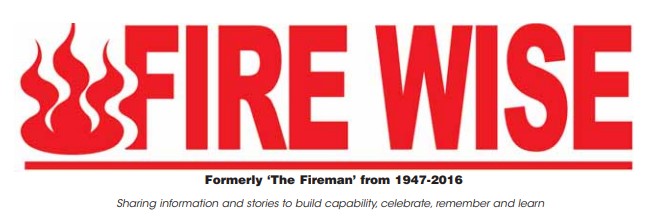
The February 2021 edition of Fire Wise has been published online only, this edition and past editions are available from the Fire Wise website.
You can support Fire Wise and the role it plays as an independent voice in keeping volunteers informed by becoming a subscriber. To become a Fire Wise subscriber visit the Fire Wise website or contact the Managing Editor of Fire Wise, Gordon Rippon-King either by phone 0402 051 412 or email This email address is being protected from spambots. You need JavaScript enabled to view it.
COVID-19 Portal
CFA has reported that the Pandemic Team continue to work towards a ‘roadmap to normal’ as brigades continue to train and meet under more relaxed protocols as part of the transition to COVID-normal.
It is important that as brigades begin to return to more traditional service delivery and brigade routine that they continue to wear masks indoors, regularly sanitise hands and adhere to social distancing rules.
With the recent outbreak of COVID-19 cases in NSW and recently here in Victoria it only highlights that no-one can be complacent when it comes to infection control.
Members are asked to be extremely vigilant in ensuring the correct COVID protocols are adhered to at all times. The CFA coronavirus online portal will continue to be updated as the situation changes.
Recent articles highlighted the magnificent work done by brigades to continue to service their communities during what has been very challenging times. The COVID Portal is available from: https://www.members.cfa.vic.gov.au/mycfa/Show?pageId=covid19
CFA announces new look workwear
VFBV has welcomed CFA’s announcement of progress on CFA workwear that was provided on the 20th January.
A total of $3 million in part funding for workwear was secured from the Victorian Government back in August 2017.
After many years of delays and external interference, VFBV has been campaigning hard to see this project delivered. The working party has worked in good faith with CFA during that period, providing input and ensuring volunteer feedback was constantly incorporated into CFA’s final designs.
In excess of 5,825 individual responses to surveys and requests for feedback have been considered by the working party demonstrating the interest and complexity in the design process.
Given the broad and diverse, and sometimes polar oppositive aspects of some of the feedback - this has been a challenging process, but also demonstrates the commitment to incorporate feedback.
And while CFA did not accept all of the working party’s recommendations, we are pleased that the final design represents a smart and professional look and honours the majority of feedback received from the thousands of volunteers who contributed to the discussions.
We are also appreciative of the CFA officers who assisted with this process and supported the working party with technical knowledge.
VFBV is continuing to advocate for additional funding to provide a more fair and equitable allocation across the State and we are seeking greater flexibility for brigade and group initial allocations to provide an opportunity for brigade/group management teams to have input into their respective allocations, as well as the ability for top-up orders.
Public tenders are currently underway, and we look forward to workwear rolling out later this year.
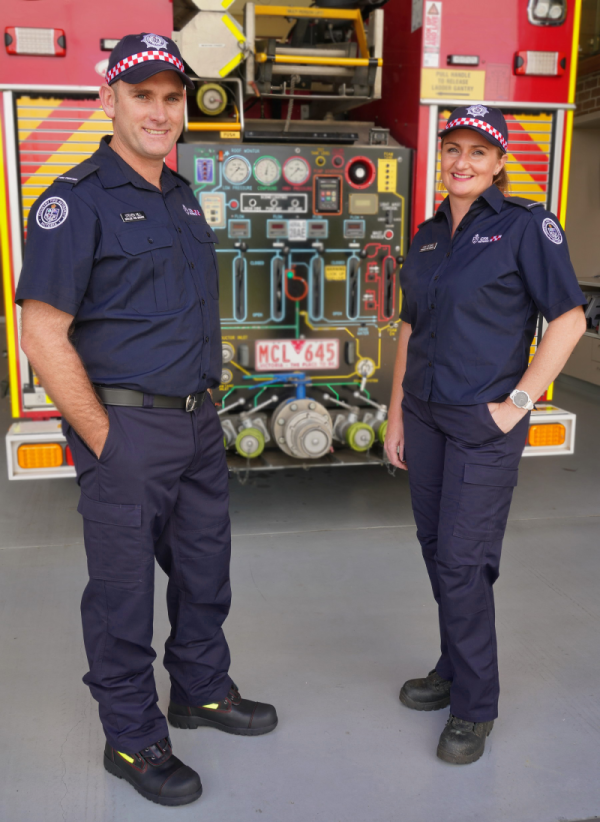
Pilot extended
VFBV welcomes the extension of the State Government’s Provisional Payment pilot, which has been extended to June 30th 2021.
The pilot program allows CFA volunteers to access reimbursement for medical treatment and services while their compensation claim is being assessed and for a period of up to 13 weeks in the event their claim is rejected. The pilot is being offered to not only CFA members, but Victoria Police, Ambulance Victoria, FRV, ESTA, DELWP and other emergency related public sector volunteers and employees including registered nurses.
Good engagement with VFBV and CFA volunteers was established early in the pilot with former Minister for Workplace Safety, the Hon. Jill Hennessy MP engaging with us early and encouraging our participation on the pilots steering group.
VFBV is represented on the Governments Pilot Steering Committee by CEO Adam Barnett who reports good progress with wide collaboration between the agencies, departments and stakeholders involved.
The intent of the pilot is to transition to permanent and ongoing arrangements with legislative changes currently before Parliament. VFBV is advocating strongly to government and CFA to ensure the same arrangements are mirrored in the CFA Regulations to ensure no gap in coverage for CFA volunteers covered by CFA volunteer compensation.
VFBV encourages any member who may be experiencing a mental health injury or trauma such as PTSD, depression or anxiety that has been caused by CFA service to make contact with the CFA wellbeing team on 1800-959-232, and consider accessing the provisional payments pilot. A claim form is available from your CFA District Office, and VFBV has requested the forms also be made available online. Any members having difficulty accessing the pilot should make contact with a VFBV State Councillor or Support Officer for priority assistance.
Further information on the pilot can be located on the VFBV website.

Structural Helmet safe stowage
The Joint Equipment & Infrastructure Committee has discussed the roll out of the new structural helmets which are nearing completion after experiencing many delays due to the COVID restrictions across the State.
During this time CFA Engineering continued to work on options for the safe stowage of the new structural helmets in appliances. Members would understand that this is a complicated process due to the many variants in CFA’s fleet of Tankers, Pumpers and specialist vehicles.
Priority is being given to the fitment of helmet stowage to appliances at Brigades that already have the Pacific F15 helmet. Helmet stowage for the remaining appliances is intended to be modified in parallel or ahead of the remaining roll out of helmets.
Some Brigades have been involved in testing brackets and bags and providing feedback to CFA for improvements. Consideration has prioritised passenger safety, accessibility, compliance with OH&S regulations and vehicle limitations.
The fleet of pumpers were fitted first with the light pumpers now being considered and a prototype bracket being designed for testing before final fitment is completed.
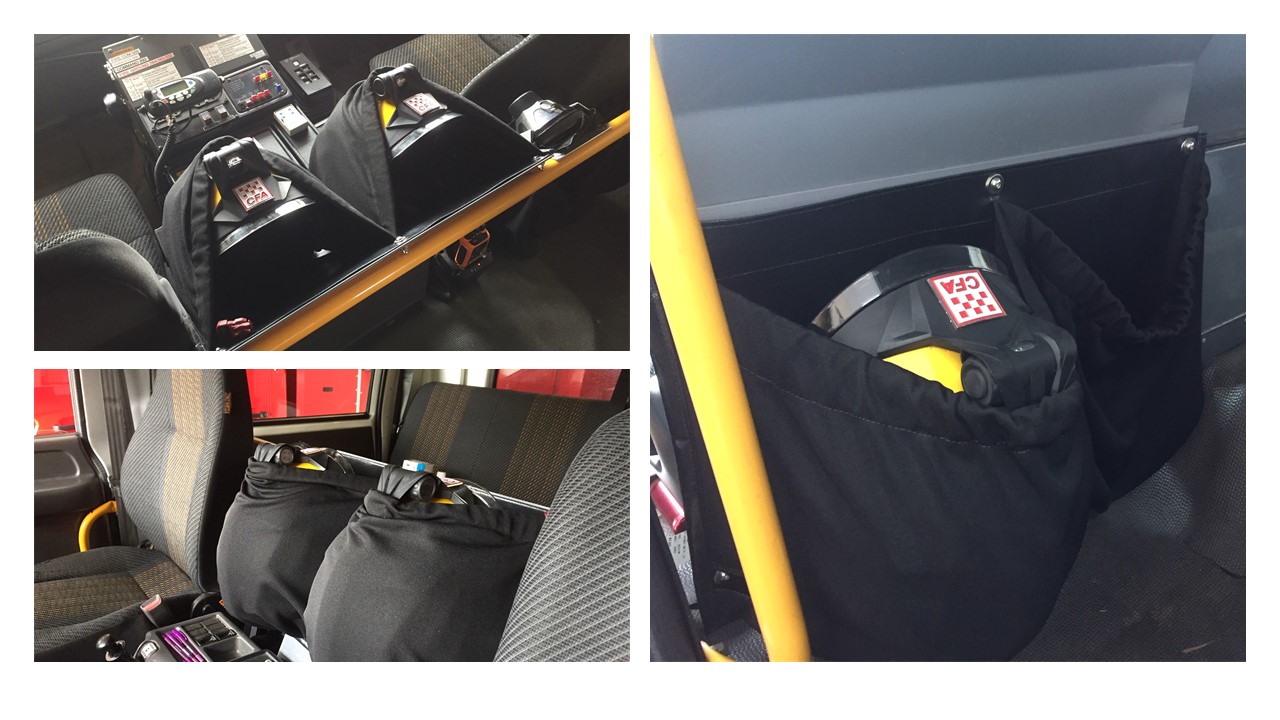
Ground observers for the future
VFBV is continuing its advocacy through the Joint VFBV/CFA Operations Committee on behalf of volunteers concerned there may not be sufficient volunteer Ground Observers for future fire seasons.
VFBV has highlighted the lack of pre-requisite training being provided and the lack of support to build this capability over recent years.
CFA has confirmed the volunteer capacity in the state’s ground-based Intelligence gathering (GIP) role has diminished over time.
Reports indicate that 229 ground observers have gone across to FRV with only 50 volunteer ground observers still remaining within CFA.
Discussions on a ground-based intelligence gathering plan are being discussed between CFA and Forest Fire Management Victoria.
The plan is considering an interoperable enhanced training package for sector commanders/ division commanders to ensure personnel have the experience and course prerequisites to competently deliver ground-based intelligence gathering.
The work will involve FFMV, SES and CFA to develop a joint ground-based intelligence gathering course for all incidents and sustain an increased capability for CFA volunteers to operate in this important field.
CFA will soon call for expressions of interest for volunteers who wish to train as a ground observer and have the required pre-requisites.
VFBV encourages volunteers to apply.
Australia Day Honours 2021
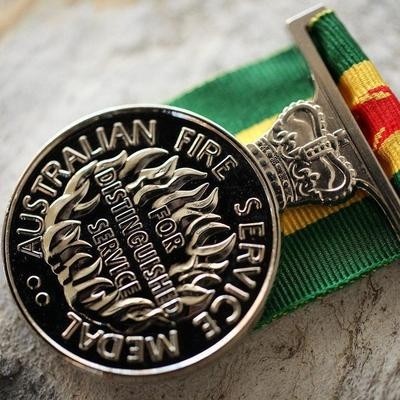
Included in the 2021 Australia Day Honours list announced on 26th January 2021 was five CFA members who were awarded the Australian Fire Services Medal (AFSM) in recognition of their contribution to the community.
VFBV congratulates Ross Coyle (Wodonga West Fire Brigade), Ian Hay (Gisborne Fire Brigade), Mark Roberts (Cobden Fire Brigade), Leighton Wraith (Dunkeld Fire Brigade) and Greg Leece (Ocean Grove Fire Brigade) for their outstanding contribution to CFA and the broader community.
You can read more about the CFA members awarded the Australian Fire Service Medal on our website.
2021 State Championship Entries
Entries for all of the State Championships at Mooroopna in March are still coming, with entry numbers currently:
| Urban Juniors: 41 team | Urban Seniors: 39 teams |
| Rural Juniors: 32 teams | Rural Seniors: 48 teams |
VFBV strongly encourages brigades and teams who have not yet entered to consider competing at any of this year's State Championships (dates listed below).
Members can register online to request relevant entry forms to be emailed to them for completion and submission. For any queries in regard to entering, or for assistance with the online forms, please contact Jenni at the VFBV office either by email This email address is being protected from spambots. You need JavaScript enabled to view it. or the call the VFBV office on 03 9886 1141.
2021 State Championship Dates
Urban Juniors: Mooroopna, 20 and 21 March 2021
Urban Seniors: Mooroopna, 27 and 28 March 2021
Rural Seniors: Mooroopna, 27 March 2021
Rural Juniors: Mooroopna, 28 March 2021
Enjoy the VFBV monthly newsletter?
If you enjoy reading the VFBV newsletter each month, why not share it with your fellow volunteers?
Either share this page with others who may enjoy the articles or encourage other volunteers to sign up to receive their own copy each month here.
More...
Mental health support is available for CFA volunteers and other Victorian emergency workers
Written by VFBVIf you have a work-related mental health injury, it’s important to get treatment early.
The Provisional Payment pilot allows CFA volunteers and other emergency services workers to access payments for mental health support while their Work Cover or CFA Volunteer compensation claim is being determined.
The pilot is available to eligible former and current emergency workers (including employees and volunteers) who have submitted a compensation claim to their agency for a mental health injury. It covers all reasonable medical treatment and services for related mental health injuries over a continuous 13-week period.
This may include visits to your general practitioner (GP), the cost of prescription medication, and visits to mental health professionals such as psychologists or psychiatrists.
If you have recently submitted a claim or are intending to, you should speak to your employer or volunteer agency about whether you are eligible to participate in the pilot.
If your claim is rejected, you will continue to receive payments for up to 13 weeks from the date your claim was submitted.
To find out more information about the pilot, visit https: https://www.vic.gov.au/provisional-payments
Further mental health support services:
Beyond Blue
Depression and anxiety support
1300 224 636
Phoenix Australia
Centre for Posttraumatic Mental Health
03 9035 5599
Head to Health
https://headtohealth.gov.au/
Lifeline
13 11 14
VFBV welcomes the extension of the State Government’s Provisional Payment pilot, which has been extended to June 30th 2021.
The pilot program allows CFA volunteers to access reimbursement for medical treatment and services while their compensation claim is being assessed and for a period of upto 13 weeks in the event their claim is rejected. The pilot is being offered to not only CFA members, but Victoria Police, Ambulance Victoria, FRV, ESTA, DELWP and other emergency related public sector volunteers and employees including registered nurses.
Good engagement with VFBV and CFA volunteers was established early in the pilot with former Minister for Workplace Safety, the Hon. Jill Hennessy MP engaging with us early and encouraging our participation on the pilots steering group.
VFBV is represented on the Governments Pilot Steering Committee by CEO Adam Barnett who reports good progress with wide collaboration between the agencies, departments and stakeholders involved.
The intent of the pilot is to transition to permanent and ongoing arrangements with legislative changes currently before Parliament. VFBV is advocating strongly to government and CFA to ensure the same arrangements are mirrored in the CFA Regulations to ensure no gap in coverage for CFA volunteers covered by CFA volunteer compensation.
VFBV encourages any member who may be experiencing a mental health injury or trauma such as PTSD, depression or anxiety that has been caused by CFA service to make contact with the CFA wellbeing team on 1800-959-232, and consider accessing the provisional payments pilot. A claim form is available from your CFA District Office, and VFBV has requested the forms also be made available online. Any members having difficulty accessing the pilot should make contact with a VFBV State Councillor or Support Officer for priority assistance.
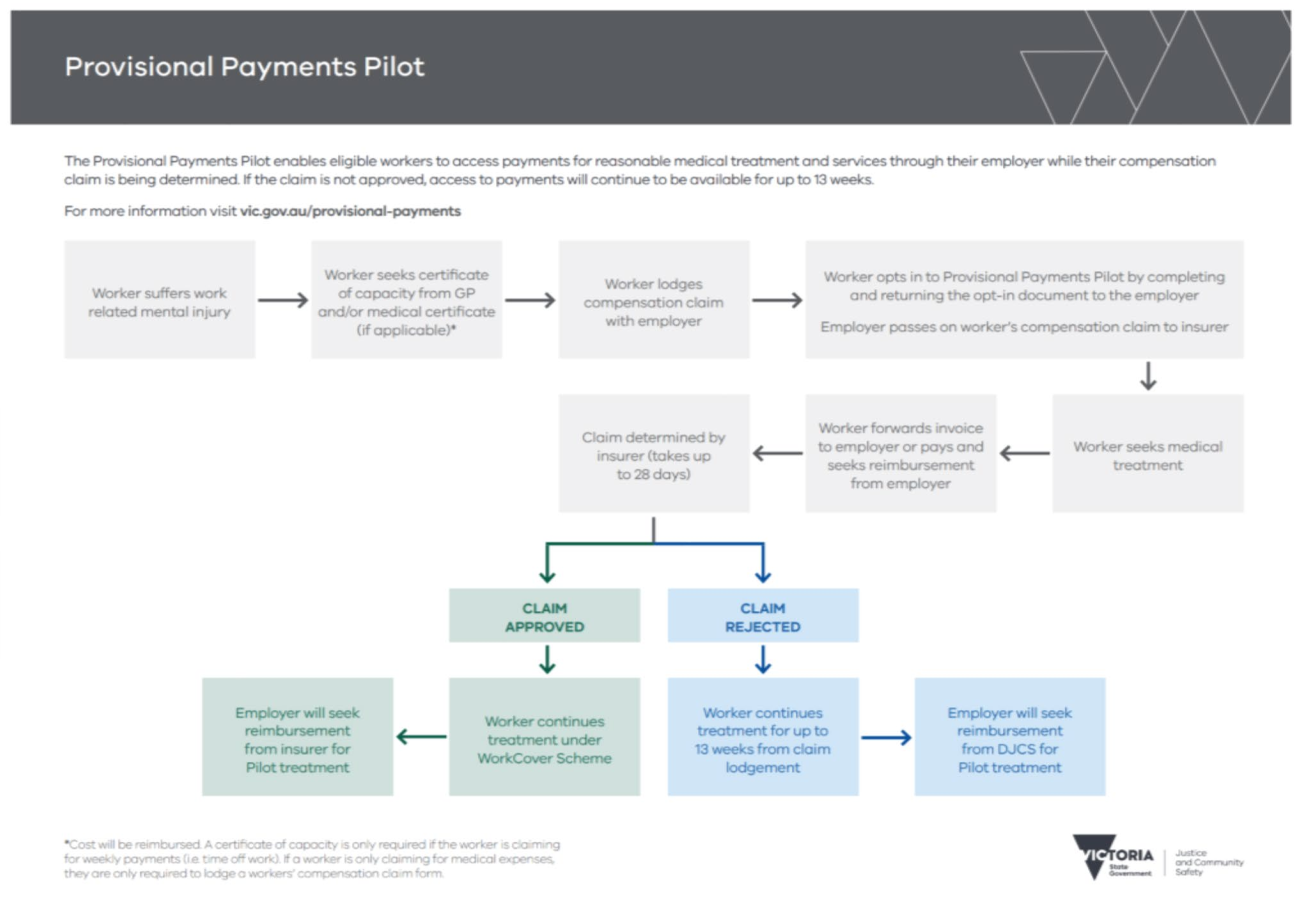
Included in the 2021 Australia Day Honours list announced on 26 January 2021 was five CFA members who were awarded the Australian Fire Services Medal (AFSM) in recognition of their contribution to the community.
VFBV congratulates these members for their outstanding contribution to CFA and the broader community.
Ross Coyle – Wodonga West Fire Brigade
Ross has been a CFA volunteer for 35 years first joining CFA as a junior. Ross has contributed to CFA in many ways, including as a volunteer nominee to the CFA Board from 2010 to 2016 which was a period of significant change for CFA. While a member of the CFA Board, Ross was a strong advocate for rural and growing regional communities and also chaired the Service Delivery Committee and the CFA Honours and Awards Committee. Ross has played a number of key operational leadership roles both at home in North East Victoria and on interstate strike teams, as well as serving as Captain of Wodonga West Fire Brigade for four years. You can read more about Ross’ service here. https://news.cfa.vic.gov.au/-/dedicated-service-to-cfa-recognised-with-top-honour
Ian Hay – Gisborne Fire Brigade
Ian joined CFA in 1975 as a volunteer with the Bullengarook Fire Brigade and later transferred to Gisborne Fire Brigade. During his time with CFA, Ian has held roles such as Group Officer for the Mount Macedon Group, Group Communications Officer and Brigade Secretary as well as being a Level 2 Incident Controller, a Level 3 Operations Officer and a Divisional and Sector Commander. You can read more about Ian’s service here. https://news.cfa.vic.gov.au/-/high-honours-for-gisborne-firey
Mark Roberts – Cobden Fire Brigade
Mark has been a member of the Cobden Fire Brigade for 30 years, first joining as a member of the junior running team. Since then Mark has progressed through the ranks taking on a number of roles including coaching juniors who are now coming through the ranks of his brigade and has also been the Group Officer for the Cobden Group since 2007. Mark has been an outstanding operational leader who has contributed to CFA and his community over many years, including during the aftermath of the St Patrick’s Day Fires in 2018 . You can read more about Mark’s service here. https://news.cfa.vic.gov.au/-/community-hero-honoured-with-afsm
Leighton Wraith – Dunkeld Fire Brigade
Leighton’s volunteering with CFA has taken place over the last forty years in the South West of Victoria, particularly with the Bochara and Dunkeld Fire Brigades. Leighton has been integral in the establishment of the Hamilton CFA-EMV Air Base and its facilities which took over seven years to complete while also recruiting over 40 volunteers to take on roles at the air base. You can read more about Leighton’s service here. https://news.cfa.vic.gov.au/-/aviation-hero-receives-prestigious-award
Greg Leece – Ocean Grove Fire Brigade
While Greg's AFSM was awarded through the Department of Environment, Land, Water and Planning, Greg has been a dedicated CFA volunteer concurrently with CFA for over 40 years. Greg’s AFSM acknowledges his distinguished service with both the Department of Environment, Land, Water and Planning as a prescribed firefighter and his service as a CFA volunteer of over 40 years, initially with the Seymour Fire Brigade and currently with the Ocean Grove Fire Brigade. Greg has been a strong leader in fire planning across Victoria and has been actively involved in refining and improving the Incident Shift Plan templates to make them more fit for purpose.
VFBV congratulates these five CFA members for their outstanding contribution to CFA and the broader community along with all other Australians recognised in the Australia Day Honours this year.
Other Victorian firefighters to receive the Australian Fire Service Medal honour on Australia Day were:
- Brendan Angwin – Fire Rescue Victoria
- Craig Brownlie – Fire Rescue Victoria
- Jonathon Gwilt – Parks Victoria
- Kevin Legge – Department of Environment, Land, Water and Planning
VFBV congratulates these fellow fire service members for their outstanding contribution to the state of Victoria.
Nominations for AFSM's
Nominations for AFSM's are accepted at any time through CFA's Honours and Awards Committee.
The AFSM honours the distinguished service of members of fire services who make an exceptionable contribution to their communities. The AFSM recognises those whose service is above and beyond the normal zealous and faithful discharge of normal or ordinary service, either in the short or long term.
CFA volunteers are often modest and reluctant to seek out recognition for the service they have provided to their community and may not have a realistic appreciation of the impact they have had on CFA, their community, within VFBV or your Brigade or Group. They’re not in it for the honour or glory, but it’s up to each of us to ensure we take the time to say ‘thank-you’ to those people who have stepped up and help inspire us all to do better.
If you know a quiet achiever who has contributed to CFA, who goes above and beyond what could be reasonably expected of someone in a similar position, please consider nominating them for an AFSM.
The Australian Honours system has been designed to break down artificial barriers and open the Australian Honours to all parts of our society. Any member of the community can nominate any other Australian citizen for an award.
It is also critically important we encourage nominations for groups who are typically under-represented in Australian Honours like the AFSM. In particular we are encouraging a greater gender mix.
Women in particular are under-represented in AFSM’s awarded when we consider the thousands of women within the fire services across the country. And while things are improving, much more can be done.
There are so many exceptional CFA women and men deserving to be recognised, so please consider nominating someone you feel is deserving.
A common misconception is that only those members who have decades worth of service are recognised by the Honours system. The AFSM is not a long-service award, its sole criterion is distinguished service. And while prolonged service forms part of the key criteria, ‘prolonged’ is considered by the honour and awards committee’s to be taken in context as to what is considered ‘longer than usual’ and in context of what is ‘above and beyond’ the normal or ordinary service expected. Exceptional service that is sustained over a period of time can be considered as satisfying the criteria. For example, has the members contribution been in excess of expectations for a ‘normal’ member and over what duration? The Committee will consider the nature of the service or achievement within the context of a member’s service history when weighing up the various criteria.
This is especially important for women within CFA who may have their service overlooked simply because they haven’t been a Captain or Group Officer for 30+ years. While these are important leadership roles – our service is a team environment, and everyone’s contribution is valued.
Nothing should take away from the incredible achievement decade long service is, but the Honours system is designed to recognise those that make a significant contribution, and to represent the things that our communities believe to be deserving of recognition, including from those who are perhaps trailblazers for others to follow. Think of those people who have pushed the boundaries or have been first to reach and hold leadership positions that has been inspirational to those around them. For example, think of members who have overcome additional barriers, like English not being their first language and who have toiled away to learn the language and become masterful communicators designing new innovative community safety engagements to CALD communities and serving as a role model for other community members. Who are the people you look up to? Who are the people who have really made a difference in your Brigade or Group?
Distinguished service includes service that is above and beyond and can be short-term or prolonged. It is service that can be exemplified by; responsibility for an outstanding event that has proven to be of significant benefit to the fire service or community; development of a new system, procedure or technique that is unique and made a significant contribution to the fire service; or outstanding leadership in the encouragement and development of others, particularly youth within the fire services.
While it can seem daunting to nominate a potential recipient, some guiding principles that could assist in completing a nomination for an AFSM are:
- In what role(s) has the nominee excelled?
- How has the nominee demonstrated service worthy of recognition?
- How has the nominee’s contribution affected a particular field, locality, brigade, group or community at large?
- Over what period has the nominee made a major commitment?
- Has the nominee’s contribution been recognised elsewhere?
- What makes this person stand out from others?
- What specific examples can be provided to show how the nominee’s contribution(s) have been outstanding?
Nominations for awards are strictly confidential. The person being nominated should not be approached for information or advised of the confidential nomination at any stage of the process.
Additional Resources to Assisit
Guide to Preparing Nominations for the Australian Fire Service Medal (AFSM)
Want to discuss a potential nomination or need some more information? Contact This email address is being protected from spambots. You need JavaScript enabled to view it.
About the Australian Fire Service Medal
Introduced in 1988, the Australian Fire Service Medal recognised distinguished service by members of Australian fire services and is awarded to both volunteer and paid members. The award recognised the distinguished service by members of a State or Territory Fire Service, a Fire Service of an agency of the Commonwealth, and the Fire Services of the External Territories of Christmas Island, Cocos (Keeling Island) and Norfolk Island.
The medal is awarded twice a year as part of the Australia Day award and Queen’s Birthday award announcements.
Criteria for the Australian Fire Service Medal
To be considered for this award it would be expected that the nominee has given service beyond the norm exemplified by:
- Prolonged service distinguished by exceptional performance in a particular area that has proved significant benefit to the fire service; and one or more of the following.
- Responsibility for and management of an outstanding/exceptional event that has proven to be of significant benefit to the fire service, a community or community safety generally.
- Development of a new system, or procedure, or technique that is unique and has made a significant contribution to the fire service, a community or community safety generally.
- Outstanding leadership in the encouragement and development of others, particularly youth, within the fire service and the fostering and furthering of the aims of the fire service to the long-term benefit of the fire service and the community.
- Demonstrated creativity in the development and implementation of innovative changes that have made a significant contribution to the fire service, fire/emergency operations, or the interests of community safety.
Black Summer recovery progress
By Adam Barnett, VFBV Chief Executive Officer
Welcome to a new year, and good riddance to the one just gone. I don’t think very many of us will look back on 2020 with much fondness.
And while the start of 2021 has bought back some familiar COVID-19 challenges - let’s hope the year ahead heralds the start of a rollout of an effective vaccine and the return to a relative ‘normal’.
Speaking of normal, I am relieved to observe a milder season than last year, which has certainly minimised fire activity so far. Thank-you to each and every one of you who have given up time with family, loved ones and friends during the Christmas and New Year break to respond to fires and incidents across your local communities.
And while many have been unable to travel due to border controls, it is a timely reminder that should you be planning to travel locally, you are encouraged to remember those towns that were heavily impacted by last season’s bushfires.
Please consider continuing to support these communities with your hard-earned tourist dollars should you be travelling within Victoria over the coming months. Supporting local businesses in these communities is a wonderful way to support their recovery and help them get back on their feet. And like those communities impacted by the Black Saturday fires of 2009, for many of these communities the road to recovery will take many, many years.
With the anniversary of last year’s Black Summer fires in mind, I wish to reflect on the work of VFBV and our delegates who have worked tirelessly with Brigades and members across the State but in particular the North East and South East of Victoria to support volunteers directly impacted by the 2019/20 Black Summer fires.
The VFBV Volunteer Support and Recovery Trust has been working alongside delegates and each of the VFBV District Councils over the last year to provide support and relief grants to those most heavily impacted and requiring additional support. As I said last year, we know from first hand experience that the journey back takes time, patience and understanding and we are committed to supporting our people for as long as it takes.
Immediately following the fires our Trust, in partnership with the VFBV Welfare Fund, provided over $133,000 in emergency grants to support CFA volunteers whose primary residence were destroyed by the fires. These grants help supported these members re-establish their homes or relocate should the memory of their loss be too great.
VFBV delegates were on the ground within days of the fires starting and these emergency grants and application process was streamlined and expedited so that support could be provided quickly and without fuss to help those volunteers who lost their primary residence from the fires.
Over the proceeding months, VFBV worked with Captains and Group Officers to identify and reach out to others impacted. This process was made much harder by the proceeding COVID lockdown and restrictions, but we determinedly pushed through and ensured these processes continued despite the COVID challenges.
Similar to the work we conducted following the Black Saturday fires, members were supported through two main special grant initiatives. High Impact Support grants were provided to support volunteers with repairs to their damaged residences, outbuildings, machinery and help members recover from significant livestock, feed or fencing losses.
And smaller general Support and Relief grants were provided to support volunteers with minor repairs or to help replace tools, equipment, pasture and smaller stretches of fencing.
And while this work continues, as at last month the VFBV Volunteer Support & Recovery Trust has paid out more than $255,500 in grants, on top of the $133,000 provided in emergency primary residence relief grants representing close to $400k in direct support to CFA volunteers arising from last season’s bushfires.
The Trust has now distributed over $1.1 million dollars since it was established just over 10 years ago following the Black Saturday bushfires. This is an incredible achievement and one members and delegates should be immensely proud.
And as with our Welfare Fund, we have maintained our legacy of ensuring 100% of the money we receive through donations to our charities remains in the trust and is used entirely for grants to volunteers. VFBV covers all the administration and expenses ensuring every dollar received by us is put to good use.
It goes without saying that the work of our Trust would not have been possible without the wonderful and generous support of our donors which also reached new levels during last season’s bushfires. The outpouring of support from the general public, international donors and corporate donors especially, was unprecedented. Thank-you also to those Brigades and individuals who made donations.
I wish to acknowledge the Barlow Foundation in particular. The Barlow Foundation was founded by Beverley Barlow and established in 2014. And while Beverly passed away suddenly in 2017, she left a legacy and an inspiration that carries on through her multi-generational family today as demonstrated by the foundations generous donation last year following the fires to our VFBV Volunteer Support and Recovery Trust.
On behalf of all members I wish to provide our sincerest gratitude to the Barlow Foundation’s support of our work. In particular I want to thank the Chair and CEO Debra Barlow and the whole team for their unwavering support for us and for CFA volunteers over the past year. No volunteer ever expects to be impacted by the very same fires they have routinely defended their communities against, which is what makes the work of our Trust so incredibly important when dealing with the fallout of large campaign fires that impact our own.
The VFBV Welfare Fund also notched up an important milestone in recent months, surpassing over $2 Million dollars paid out in welfare fund grants since its inception in 1918. Last year alone the Welfare Fund recorded the highest demand ever for welfare fund grants, disbursing close to $300k in emergency grants during 2020 to support CFA volunteers in significant necessitous circumstances. The Welfare Fund has not experienced anything like that kind of demand since the 2009/2010 period following Black Saturday.
And while we go out of our way to work quietly in the background and without fanfare to be cognisant of our members dignity and privacy, it is important to share these achievements and work so that members can not only share in these positive stories but also have confidence that VFBV continues to have your back and works tirelessly to support you.
Thank-you to all of our delegates that serve as either Trustees or members of the respective Committees of Management for our charities. The work you do to selflessly support our members is incredibly important and much appreciated, and I want to acknowledge the exceptionally high workload that this has bought over the past year.
And while no one ever wants these kinds of events to occur, I have often remarked that the very worst times that mother nature wreaks on us also brings out the very best in human kind. The compassion, empathy and dedication that not just Australians showed over the last 12 months to those impacted by last summers bushfires, but also people from across the world. It is not only humbling, but truly inspirational.
So, it is in this spirit that we approach 2021, as we focus on the now and continue to pursue the hopes, dreams and aspirations of all CFA brigades, groups and volunteers.
1,000TH EDITION!
And last but by no means least, I wish to congratulate Fire Wise on its 1,000th edition.
Fire Wise (formerly ‘The Fireman’) has been a trusted and respected source to firefighters across Victoria for more than 70 years. Uniquely, this independent publication has always prioritised giving brigades, members and firefighters an opportunity to contribute to it and make comments on a wide range of issues of the day.
Fire Wise/The Fireman archives provide a unique and fascinating snapshot of CFA, its brigades, and its people over the course of our history.
Gordon Rippon-King, the managing editor of Fire Wise is in fact the third generation of the King family, after founder and first editor Norman Tosh (Captain of the Warracknabeal Fire Brigade) sold the publication to Gordon’s grandfather Les King in 1953.
Les was the editor for 20 years, followed by Alan King who took over in the 1970’s who was then followed by the present editor Gordon King in 2001.
Gordon, thank-you for your tireless efforts and dedication in providing a trusted, independent and at times sole source of important information for the benefit of CFA, the associations and CFA volunteers.
Fire Wise is a reassuring constant to thousands of us across the sector. It’s been like a dependable and trustworthy friend and has been there through all the good times and the not so good.
Here’s hoping for many more pages and the many more stories yet to be told.

Fire Wise Publication - January 2021 Online edition only
The January 2021 edition of Fire Wise has been published online only, this edition and past editions are available from the Fire Wise website.
You can support Fire Wise and the role it plays as an independent voice in keeping volunteers informed by becoming a subscriber. To become a Fire Wise subscriber visit the Fire Wise website or contact the Managing Editor of Fire Wise, Gordon Rippon-King either by phone 0402 051 412 or email This email address is being protected from spambots. You need JavaScript enabled to view it.
Last Chance!
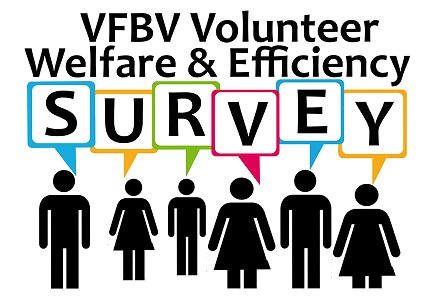
VFBV encourage all volunteers to access and complete the annual VFBV Volunteer Welfare and Efficiency Survey.
This survey is a critical feedback loop and assists us to understand the areas that volunteers want us to advocate for. The results of the survey are public and are presented in detail to Government, EMV and CFA.
The survey will be closing within days. Please visit https://www.vfbv.com.au/cfa to complete the survey today.

Training restrictions easing
Many would be aware that COVID-19 has forced CFA into restricting many activities resulting in training acquisition courses being postponed or cancelled throughout 2020.
It has been positive to learn that following public easing of restrictions, CFA skills acquisition courses can now start with CFA confirming that skills acquisition can go ahead throughout the summer period providing that there is maintained capacity and the training can be done in a COVID-Safe manner.
VFBV welcomes this news and will monitor the situation as we understand that many Brigades are finding that restrictions have created a backlog and the difficulty in being able to upskill members over recent months, especially in vital training such as Breathing Apparatus.
VFBV can also confirm that CFA’s position is that skills acquisition training can continue throughout the Fire Danger Periods with CFA committing to ensuring that Instructors will be made available anywhere in the State when and where required.
State Championship Registration
A reminder of the deadline of 1st February 2021 for preregistration for all attending any of the State Championships being conducted at Mooroopna in March.
This particularly applies to any Brigade team wanting to enter to compete and Brigade members wishing to nominate as a Track Official or Judge. Pre-registration must be completed prior to 1st February.
Due to requirements for a COVID-Safe event, the entry and registration process has changed for all 2021 State Championships as an online process through the Operoo platform, and all attending/ competing/officiating etc at any Championship event at Mooroopna, are required to preregister online at https://tinyurl.com/vfbv-operoo
Competing Brigades, please note the Brigade member who is completing the Brigade’s team entry form, must complete and have processed their own Individual Registration first, following which they will be forwarded the relevant entry forms and information. Members completing Brigade entries will need to allow sufficient time for their own preregistration to be processed before the entry form will be sent to them.
Likewise all members wanting to nominate as a Track Official or Judge need to complete their Individual Registration first, at which time they will be prompted to complete the relevant nomination form ensuring that VFBV know which role/position you are nominating for to ensure you are included on the relevant roster/s.
Any Brigade or member needing assistance with the pre-registration process, please contact the VFBV office 9886 1141 or This email address is being protected from spambots. You need JavaScript enabled to view it., or contact CFA at This email address is being protected from spambots. You need JavaScript enabled to view it.

Prototype Pumper Tanker
Members will be pleased to learn that the Prototype Pumper Tanker is close to being completed. COVID 19 restrictions have limited visibility to the build, and resulted in working party members being unable to visit the workshops as it is being built.
In welcome news earlier in December with the easing of COVID restrictions the VFBV delegates to the working party were able to view the near completed appliance at the manufacturers workshop twice before the Christmas break. The interest in this type of appliance from across the state has been positive with many requests being made for brigades and groups to be included in the statewide tour.
For those who are specification driven the Prototype has a 3000 litre water tank, 2500lt per minute hydraulic pump, tank autofill function, luminous handrails for better visibility at night, new control screens and the addition of a TIC mounted in the front bull bar as well as a full suite of battery operated rescue equipment.
CFA has agreed to working party members request to assess the appliance in its operational capabilities through a series of practical tests before it is sent on the statewide tour to brigades and groups to view.
Once finalised locations will be communicated to all districts and it is hoped that as many volunteers as possible can attend a location close to their brigade and give constructive feedback.
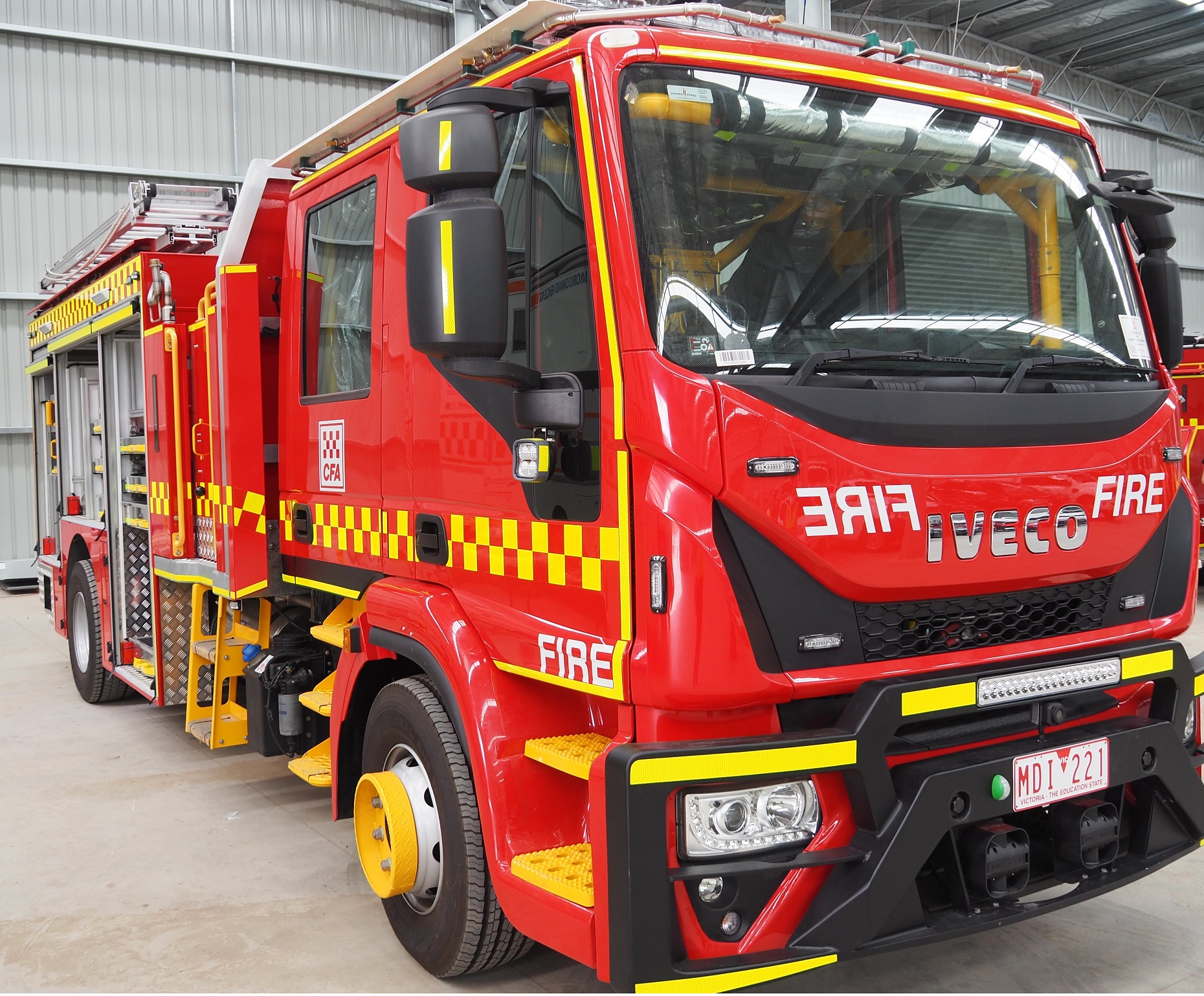
Rescue, EMR Support
VFBV delegates to the Equipment & Infrastructure Committee have strongly supported the call by volunteer rescue brigades from across the state who have been requesting CFA increase its budget to allow for much needed equipment upgrades and specialist response capability.
In welcome news, Committee members were recently informed of some new equipment expected to be rolled out soon. Brigades will see an upgraded battery-operated lighting kit as a part of an aspirational target to remove 240-volt power equipment from appliances to improve safety. The new lighting and other specialist equipment will help to ensure operators have a safer experience when attending rescues. New vehicle designs are progressing as well as continued trials of state-of-the- art equipment.
VFBV has also supported the concerns raised by rescue brigade members who have reported that the directive to discontinue the use of winches has had an impact on the ability of rescue brigades to undertake some critical specialist work. CFA has been asked to provide an outcome that will allow the use of winches to be used safely. While there has been no outcome to date, delegates will continue to pursue.
EMR upgrades are also progressing for volunteer EMR brigades with new and improved defibrillators equipped with single pad technology, Wi-Fi and Bluetooth data transfer built into the unit. Special training defibs, intelligent training mannequins and the creation of a state training cache for defibs and mannequins are progressing well.

Fire Investigators
Volunteer Fire Investigators are still reporting little to no progress on removing the arbitrary impediments that have been introduced by FRV that limit the use of volunteer fire investigators.
After strong representations by VFBV over the last couple of months, CFA has reported that a ‘status quo’ arrangement is finally in place and volunteer fire investigators can and must be engaged to ensure service delivery is maintained. VFBV continues to point out that volunteer fire investigators undertake the same training and skills maintenance as their FRV counterparts, so there is no legitimate reason why they cannot continue to undertake investigations, and not doing so is clearly discriminating against volunteers.
VFBV will continue to pursue an outcome and will monitor progress.
Commander Vacancies
VFBV continues to raise concerns with the large number of operational positions left vacant through the CFA/FRV secondment arrangements.
VFBV District Councils and Brigades continue to highlight the large gaps in the ability to fill key commander positions, with some districts working through another fire season with commander vacancies and in some instances no commanders at all. This places an unreasonable burden on Brigades and Groups as well as District Offices.
The situation is further exacerbated by some districts having Assistant Chief Fire Officer (ACFO) vacancies and insufficient leave planning resulting in high turnover of people through senior positions during the fire danger period.
VFBV delegates to the Operations Committee have reported they are aware of at least 23 Commander vacancies and six ACFO vacancies arising across the state over recent months and are continuing to raise the concern that FRV are not meeting their legislated obligations to ensure CFA capability and volunteer support is maintained.
While CFA has agreed with these concerns, there has been little evidence of progress being made to rectify it. VFBV will continue to pursue.
2021 State Championships
Urban Juniors
Mooroopna, 20 and 21 March
Urban Seniors
Mooroopna, 27 and 28 March
Rural Seniors
Mooroopna, 27 March
Rural Juniors
Mooroopna, 28 March
Recent Articles on the VFBV website
NOW OPEN – 2020 VFBV Volunteer Welfare & Efficiency Survey
Mooroopna to host all State Championships on consecutive weekends next March
2021 State Championships Registration and Entry Forms
Merry Christmas and Happy New Year
Enjoy the VFBV monthly newsletter?
If you enjoy reading the VFBV newsletter each month, why not share it with your fellow volunteers?
Either share this page with others who may enjoy the articles or encourage other volunteers to sign up to receive their own copy each month here.
2021 State Championships Registration and Entry Forms
Written by VFBVRegistration and entries are now open for all the 2021 State Championships.
- State Urban Junior Championship, 20 & 21 March 2021
- State Urban Senior Championship, 27 & 28 March 2021
- State Rural Senior Championship, 27 March 2021
- State Rural Junior Championship, 28 March 2021
Due to requirements for a COVIDSafe event the entry and registration process has changed for the 2021 championships and will be based online.
For all 2021 State Championships at Mooroopna, anyone attending, competing, officiating is required to pre-register online.
The online CFA/VFBV State Championships Individual Registration form is available here for any of the below roles:
- Brigade members (whether Coach, Captain, Secretary or member) who is completing the brigade’s team/s Entry & Registration Form. Once you have completed your own Individual Registration and indicated that you will be completing the Entry/Registration form for your brigade, you will automatically be emailed the relevant Entry & Registration Form/s and information. Please note entries close 5.00pm Monday 1st February 2021.
- Track Officials and Judges. Once you have completed your own Individual Registration please then complete the following nomination form so that we know which Championship/s you are nominating for and in what role/position to ensure you are included on the relevant roster/s:
- Urban Championships https://groups.operoo.com/public_forms/671721/new
- Rural Championships https://groups.operoo.com/public_forms/671719/new
- Coaches, Junior Leaders and Competitors over 18 years. Parents/Guardians of competitors under 18 years, will be sent a link for a consent form for their children to attend and compete once your team has been registered.
- CFA members, family members, supporters etc. Any children aged under 18 who are not competing can be registered with a parent/guardian.
- CFA and VFBV Staff.
Please note the registration for the Championships is strictly limited to:
- CFA members
- Competitors (over 18 years of age)
- CFA Coaches, Junior Leaders, Secretaries, Officials and Judges (please register ASAP to enable team registrations and entries)
- Partners and significant others
- Immediate family (children, parents, guardians and carers)
- Staff contractors, key suppliers and sponsors
CFA and VFBV are committed to running a safe an enjoyable event for everyone in 2021. It was disappointing to have to cancel the State Urban Senior, State Rural Senior and Junior Championships in 2020, and are planning for all events to proceed again in 2021. The events are due to go ahead for 2021 are subject to Chief Health Officer advice and COVIDSafe plans.
All entries will close at 5pm on Monday 1st February 2021, if you need to make any changes to your entries after this date, please contact either Jayne at This email address is being protected from spambots. You need JavaScript enabled to view it. or Jenni at This email address is being protected from spambots. You need JavaScript enabled to view it.
If you have any problems accessing the online forms please contact either Jenni at the VFBV office via email This email address is being protected from spambots. You need JavaScript enabled to view it. or 03 9886 1141 or Jayne at CFA via email This email address is being protected from spambots. You need JavaScript enabled to view it. or on 0476 660 045. Please note if you have a query, there will be limited response over the Christmas/New Year period however you will receive a response as soon a possible after this time.
COVIDSafe Championships resources
CFA have information on COVIDSafe Championships available on the Intranet (for CFA members) and on the CFA website. These pages will be updated frequently so please visit them to seek the latest advice and guidelines regarding the Championships.
Intranet: https://www.members.cfa.vic.gov.au/mycfa/Show?pageId=Championships
Internet: https://www.cfa.vic.gov.au/about/cfa-vfbv-firefighter-state-championships
 Championships
Championships 














